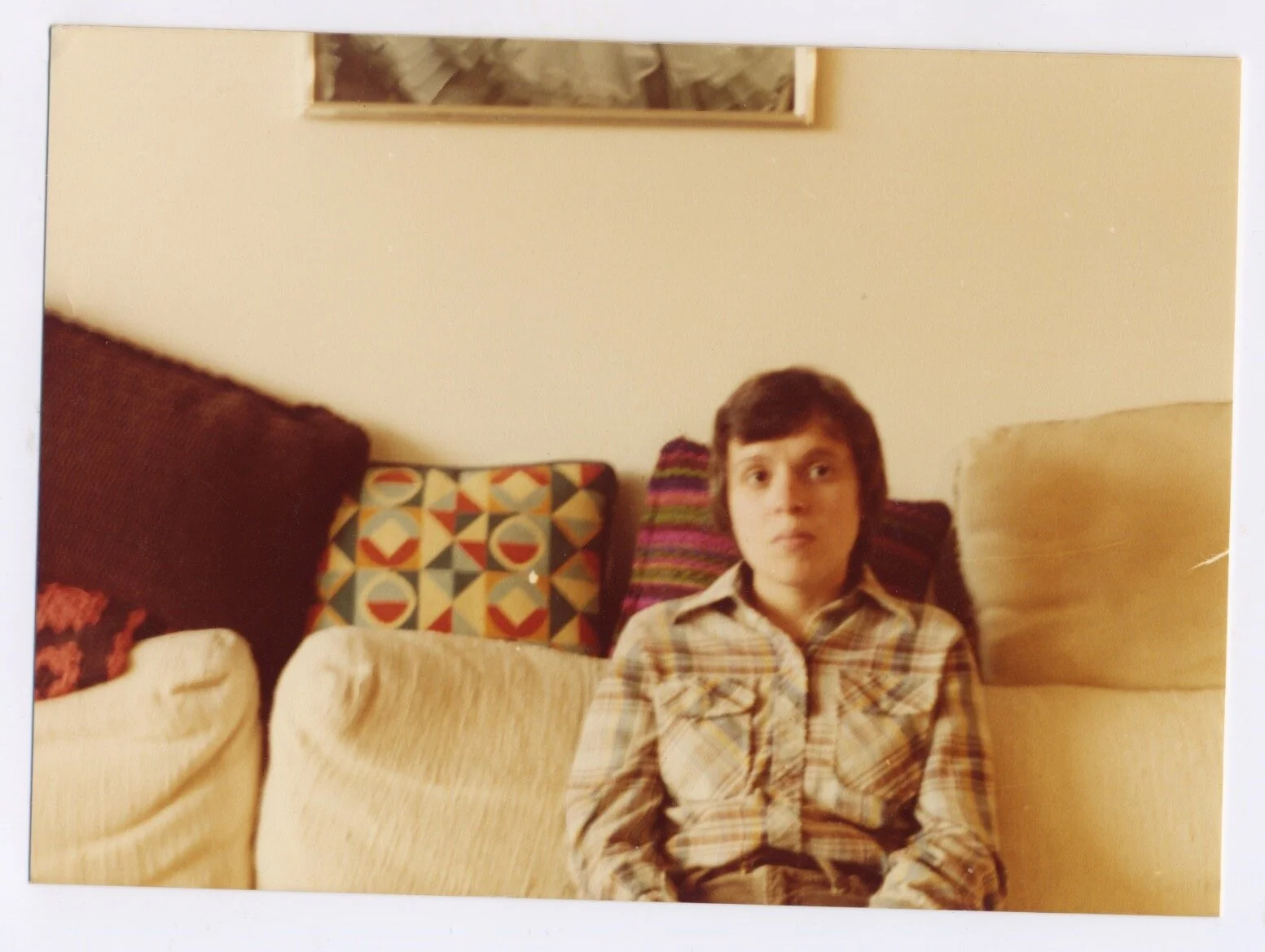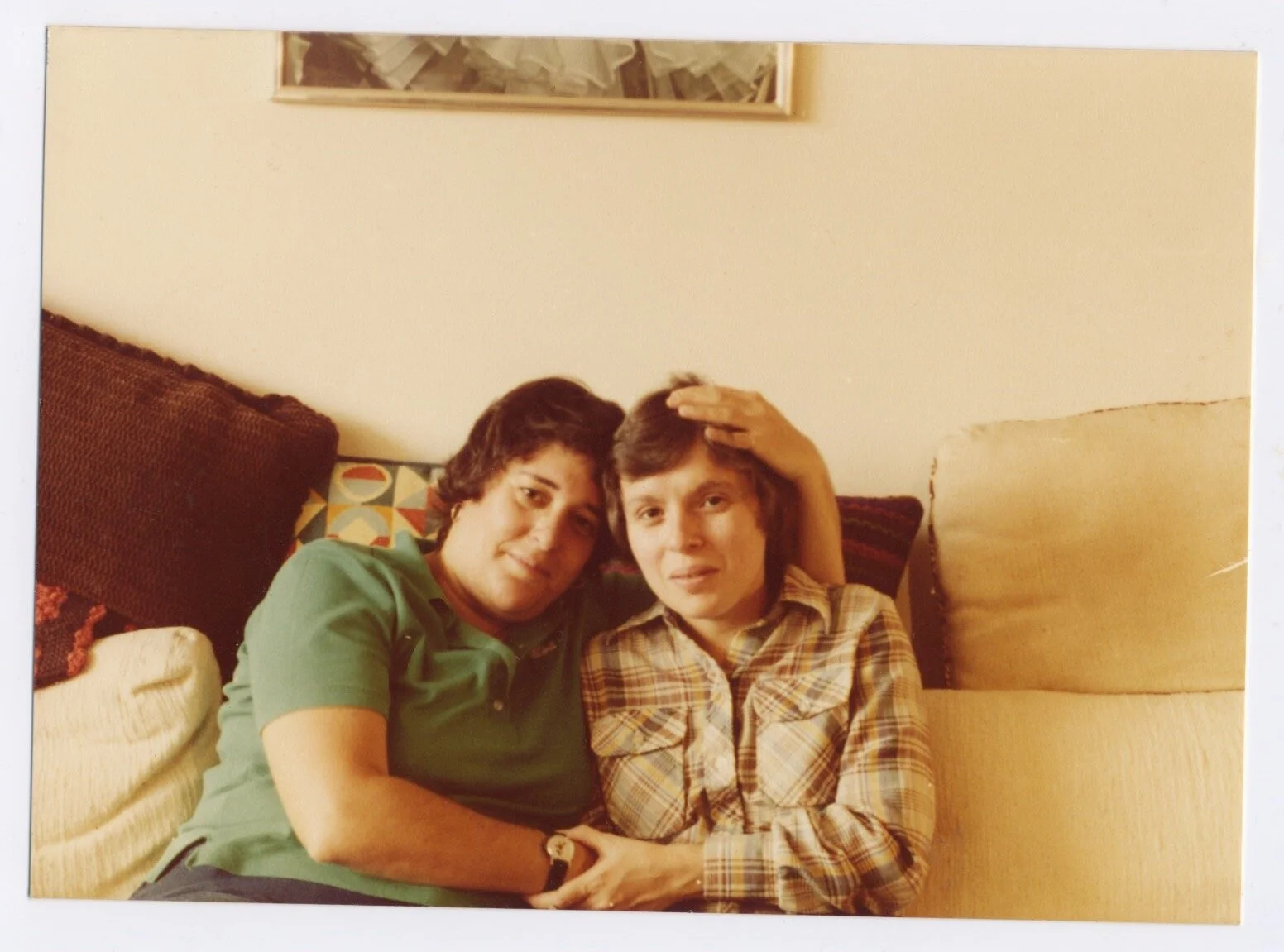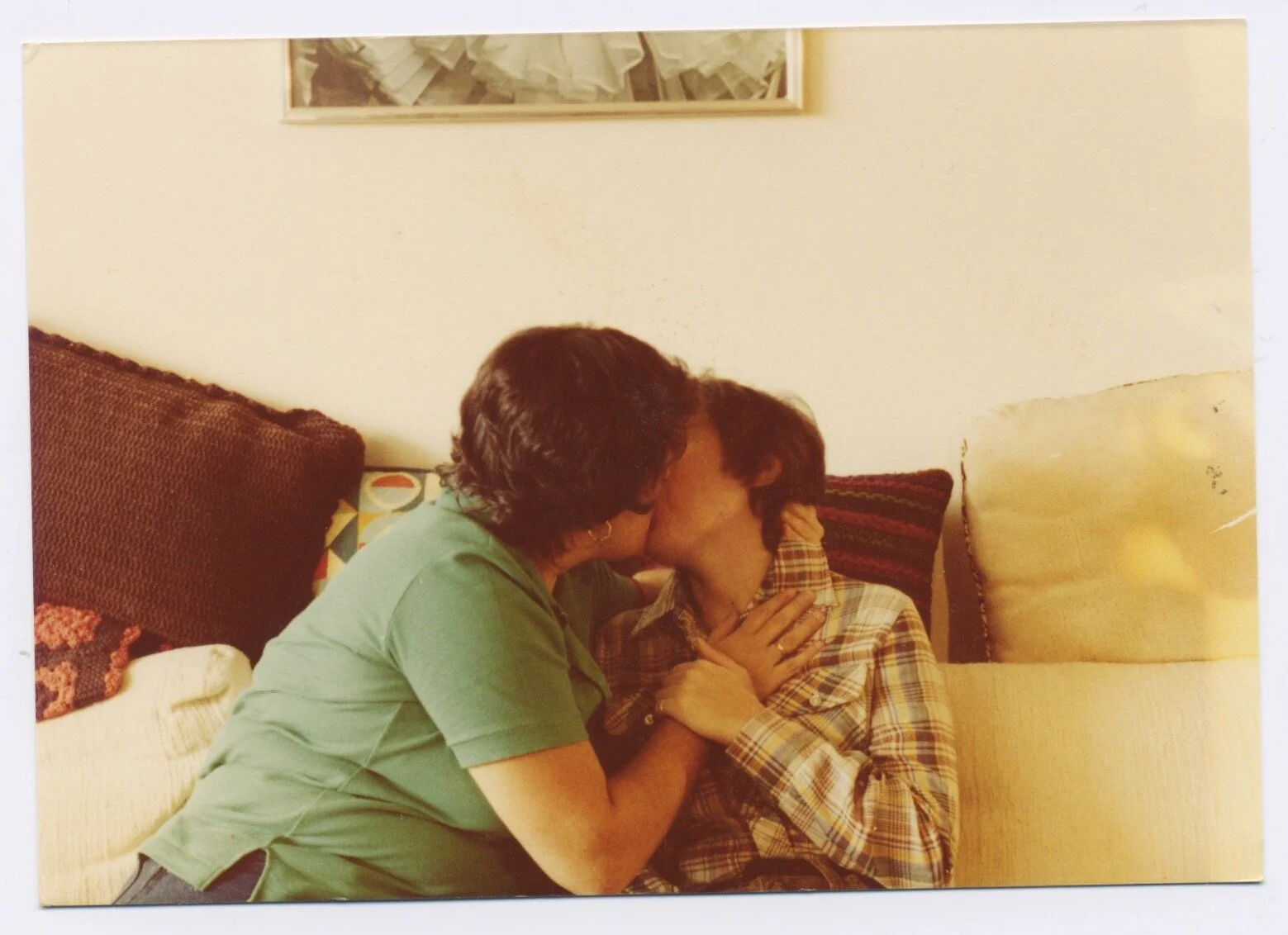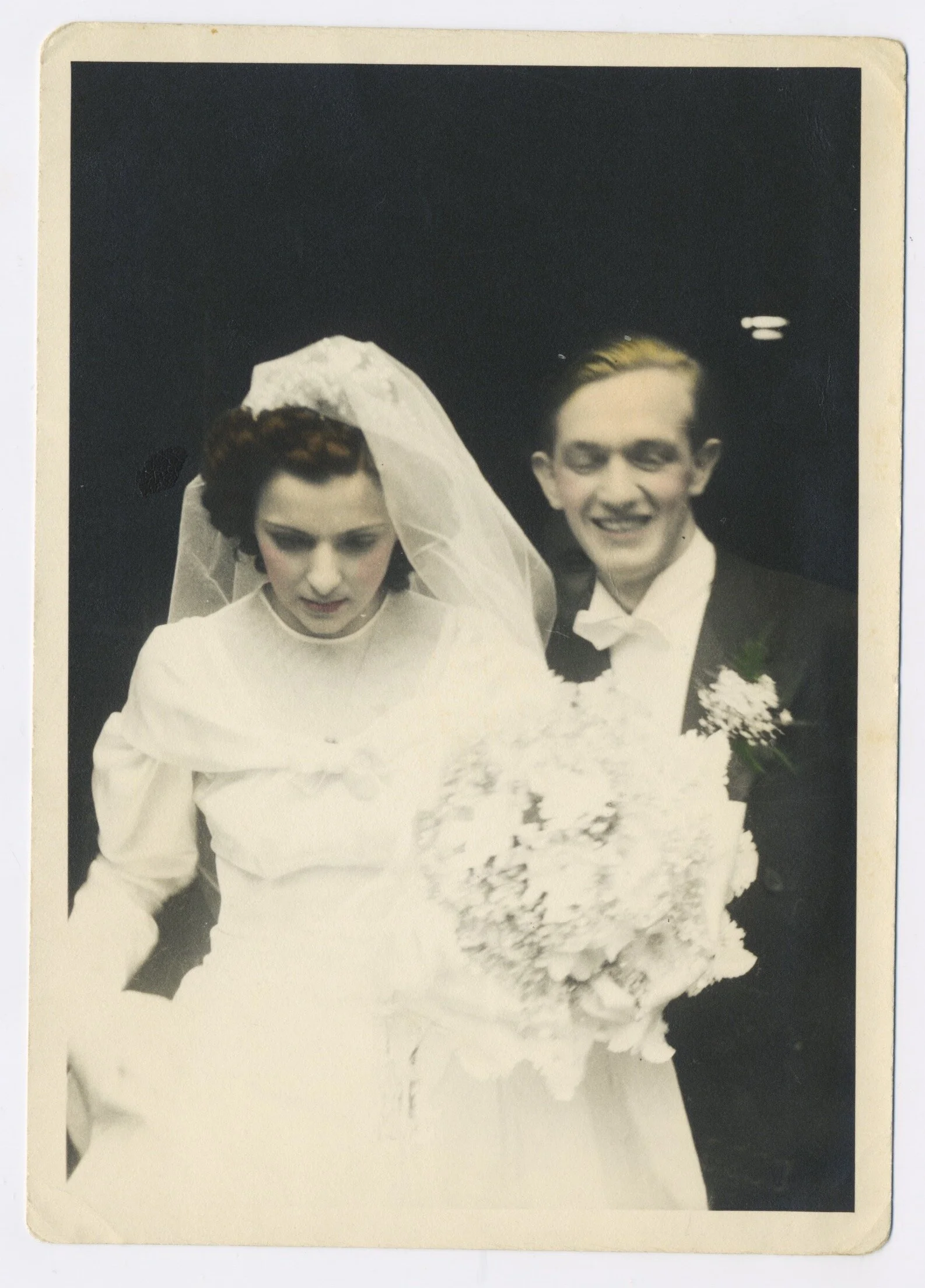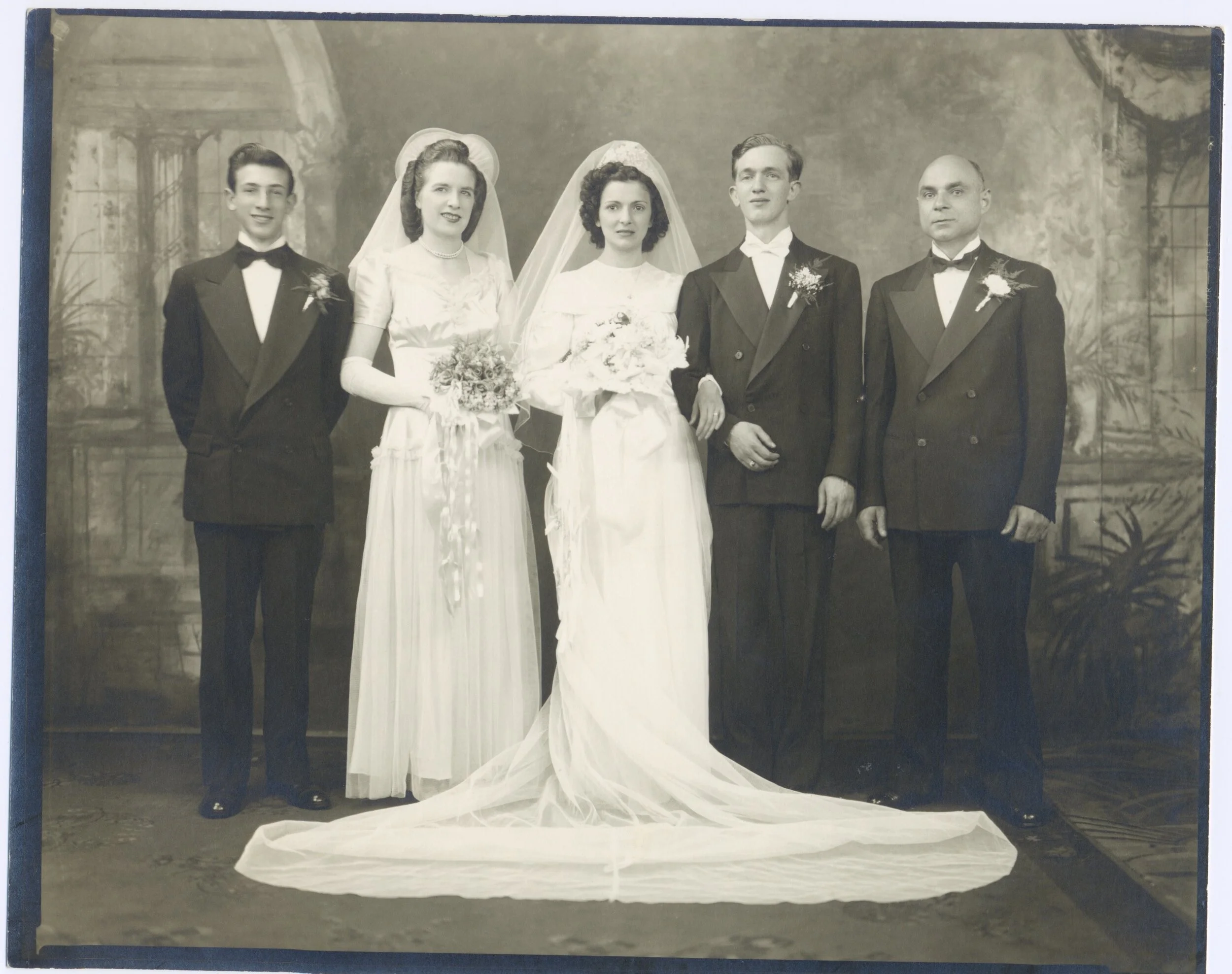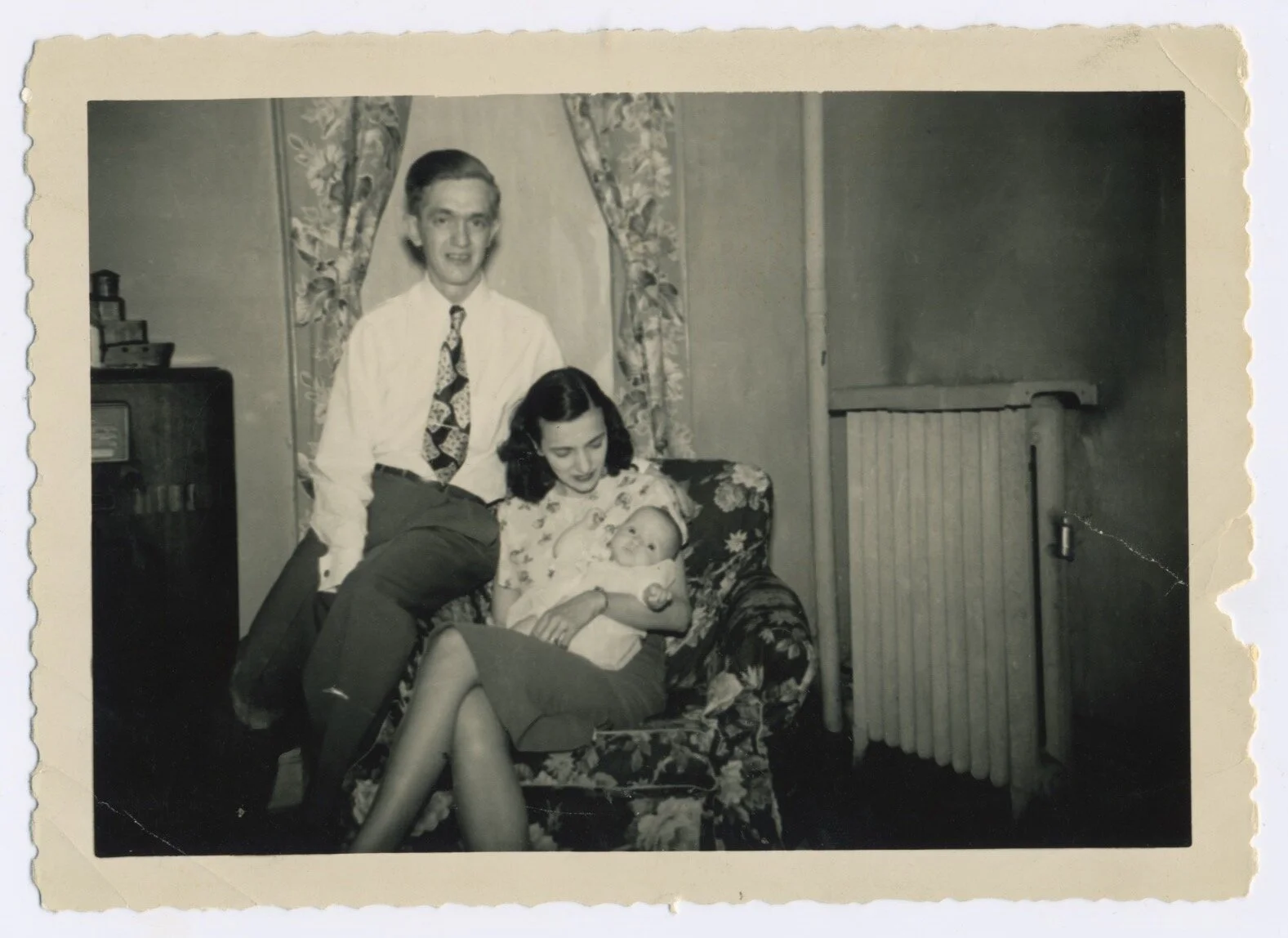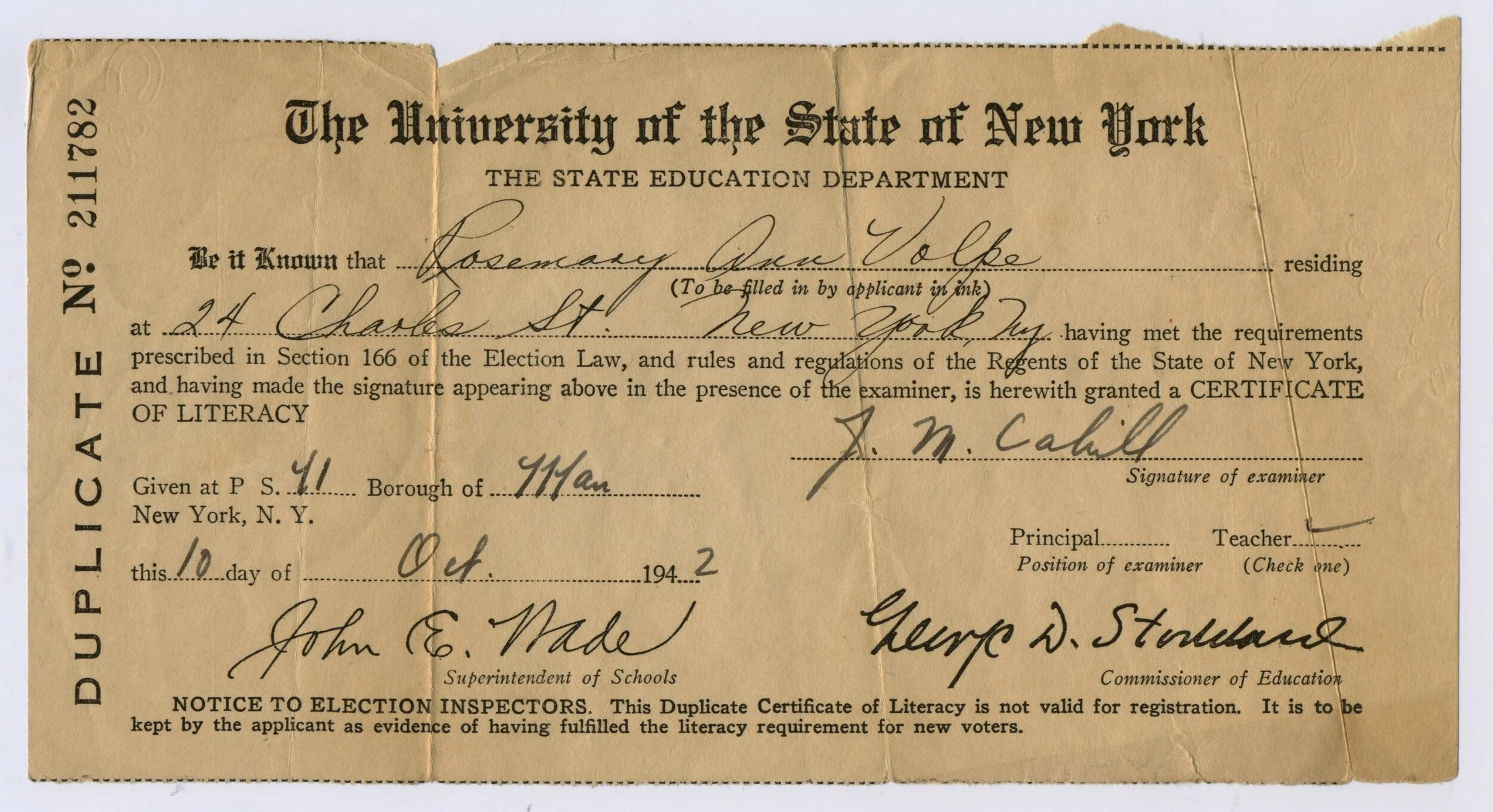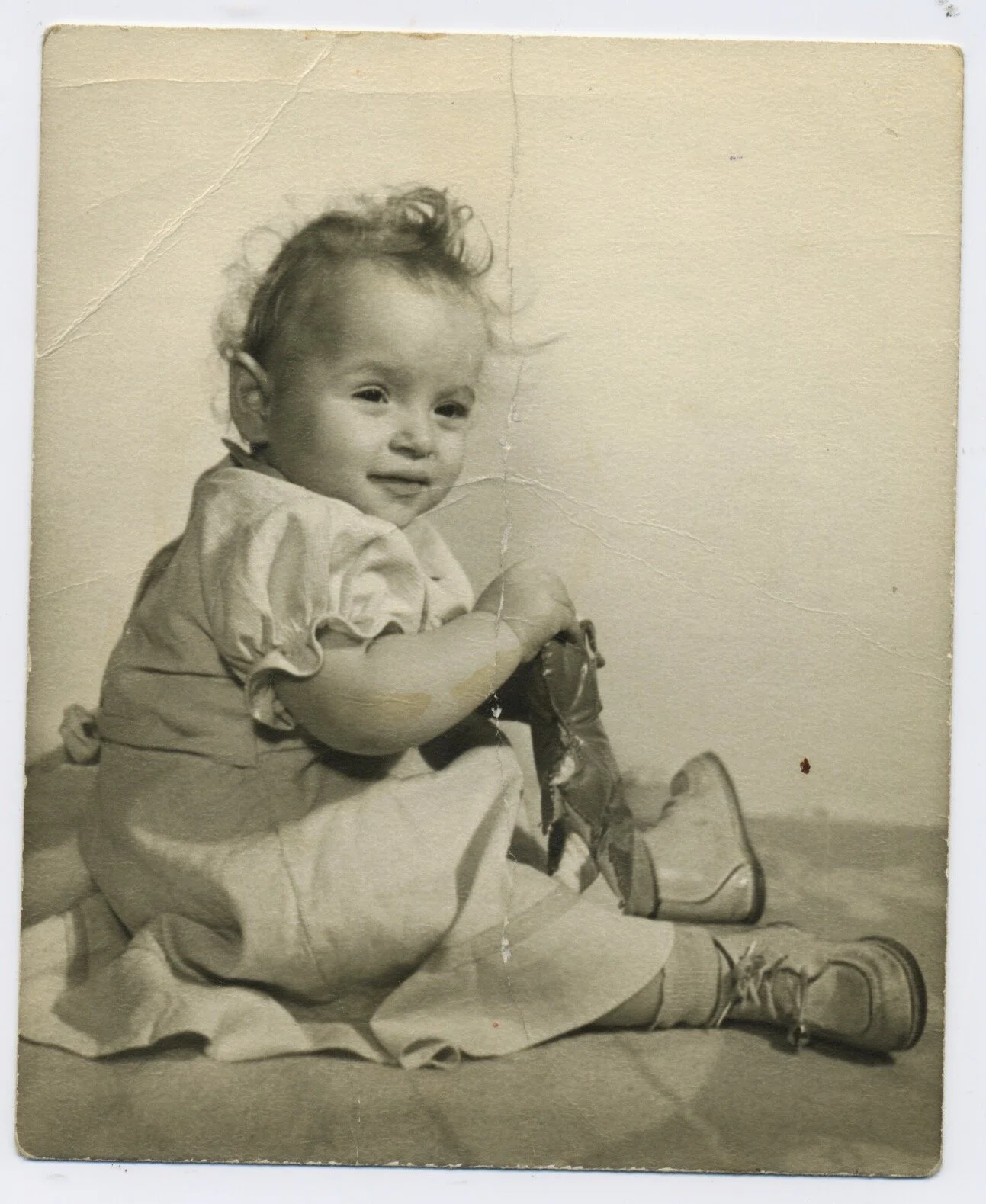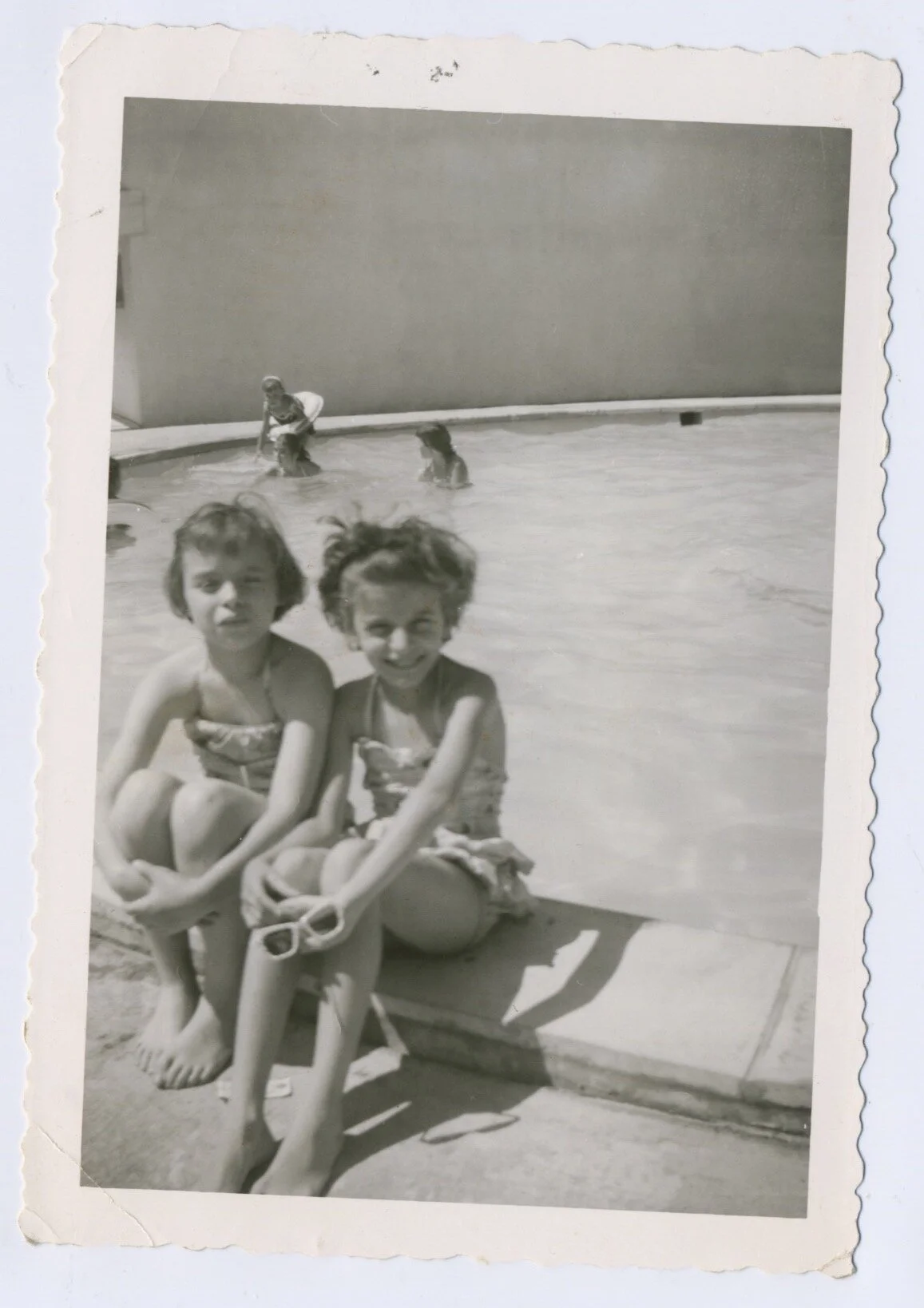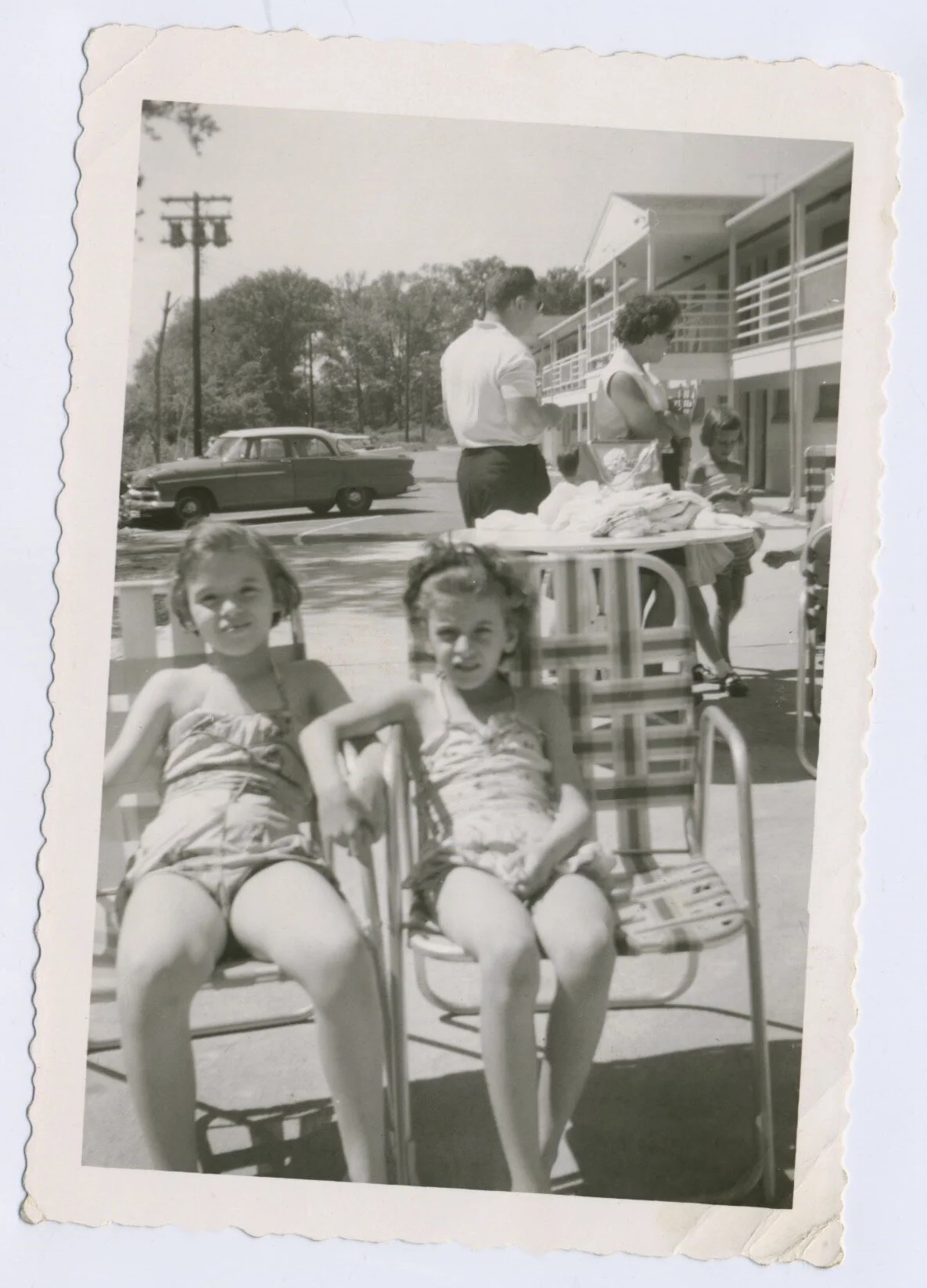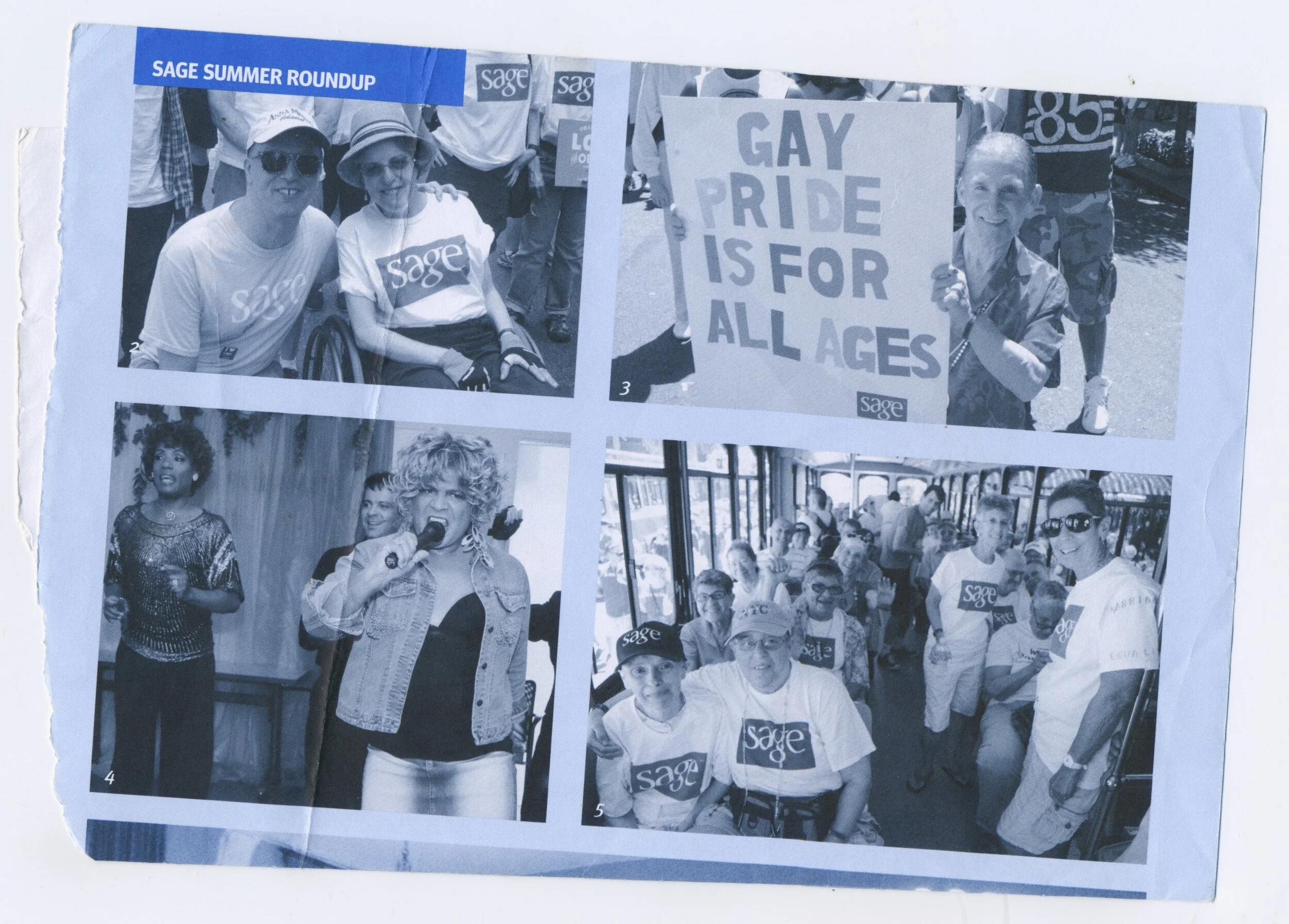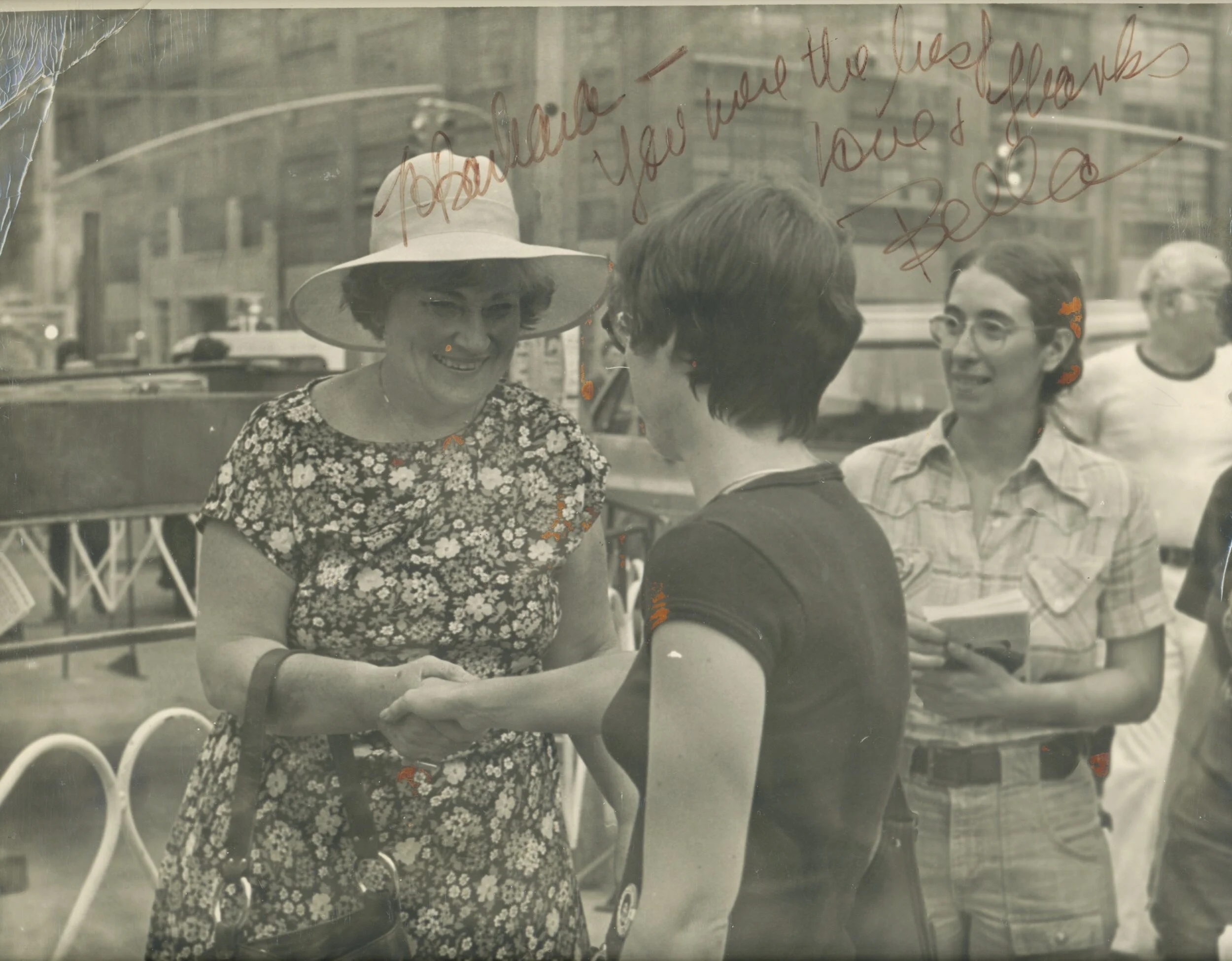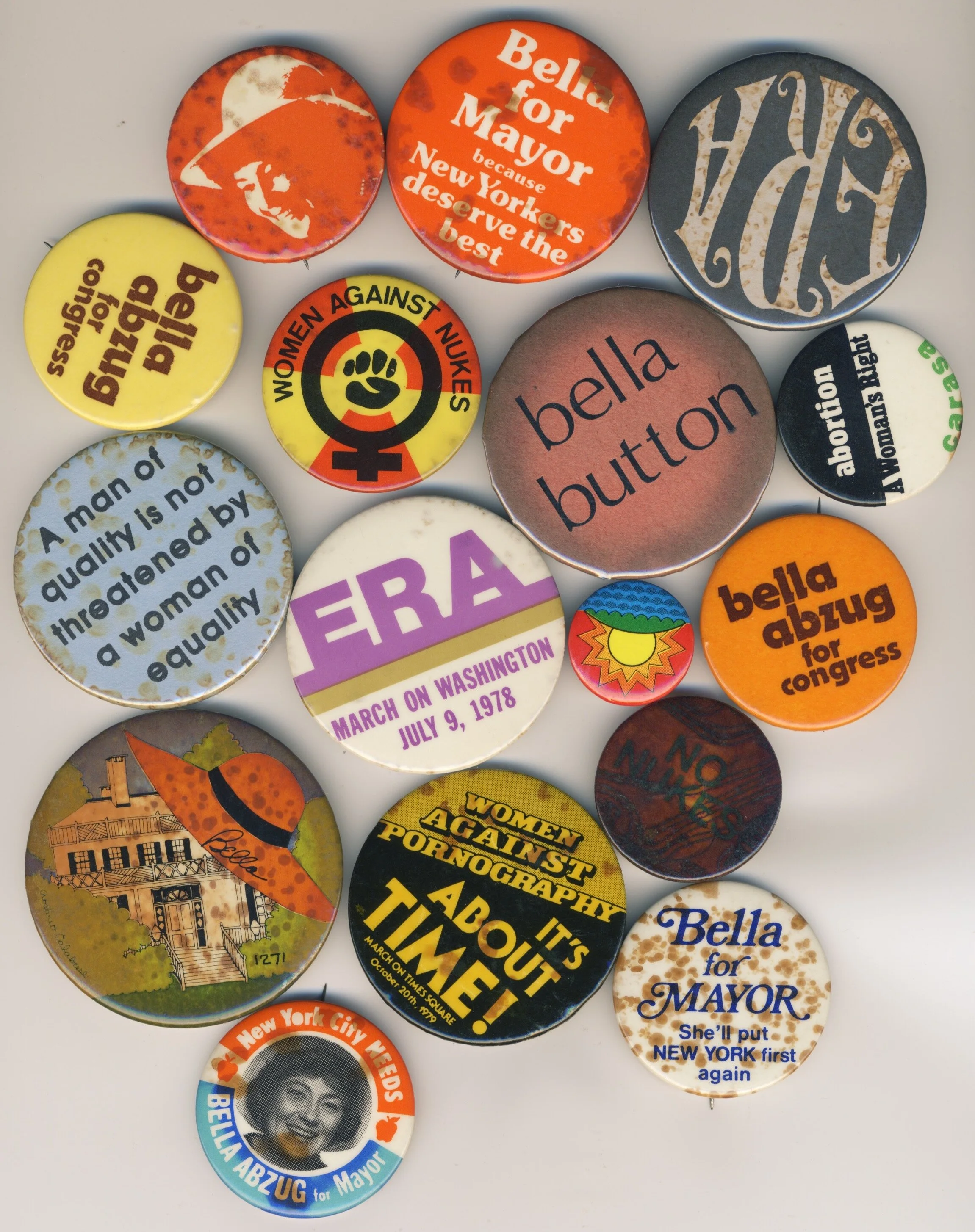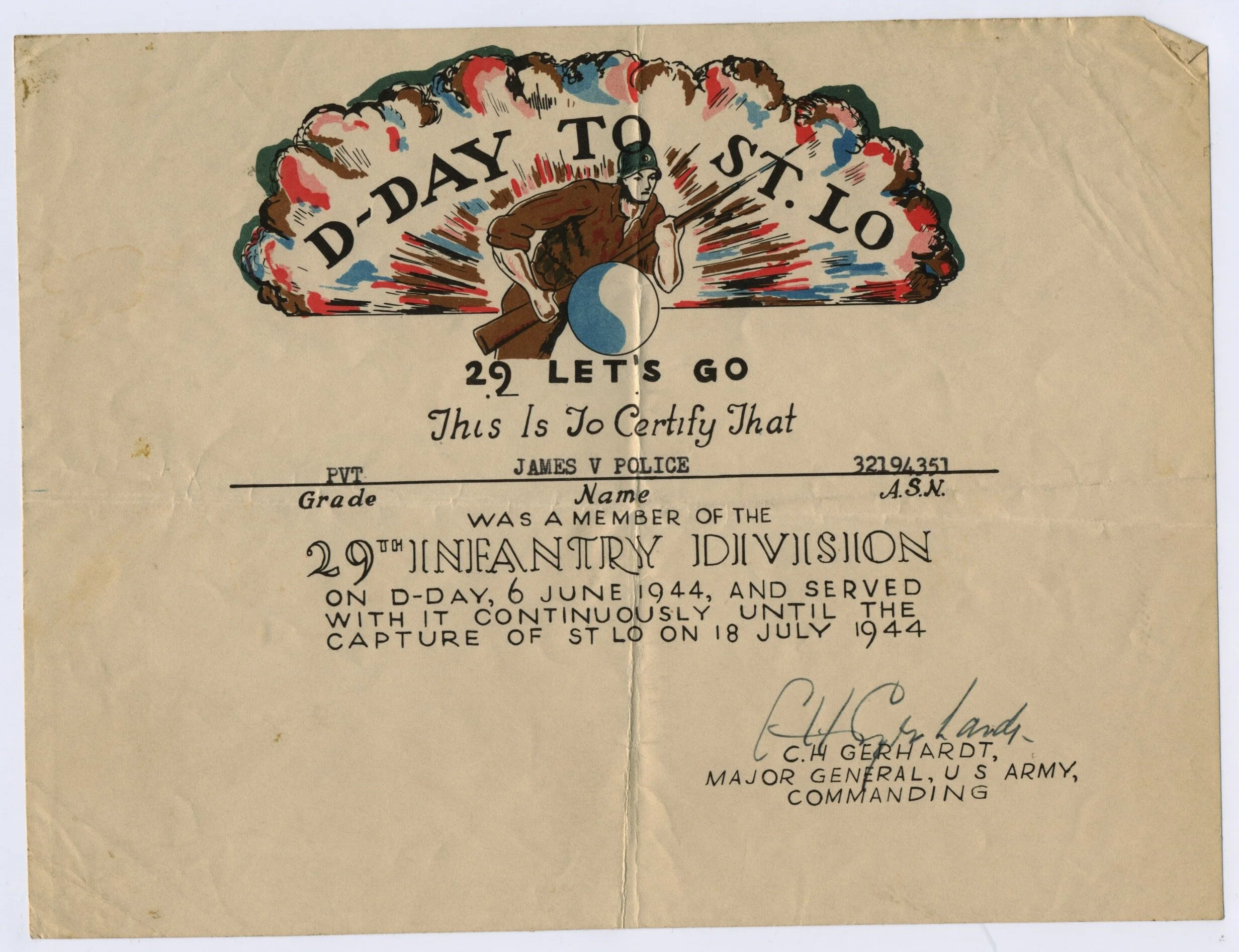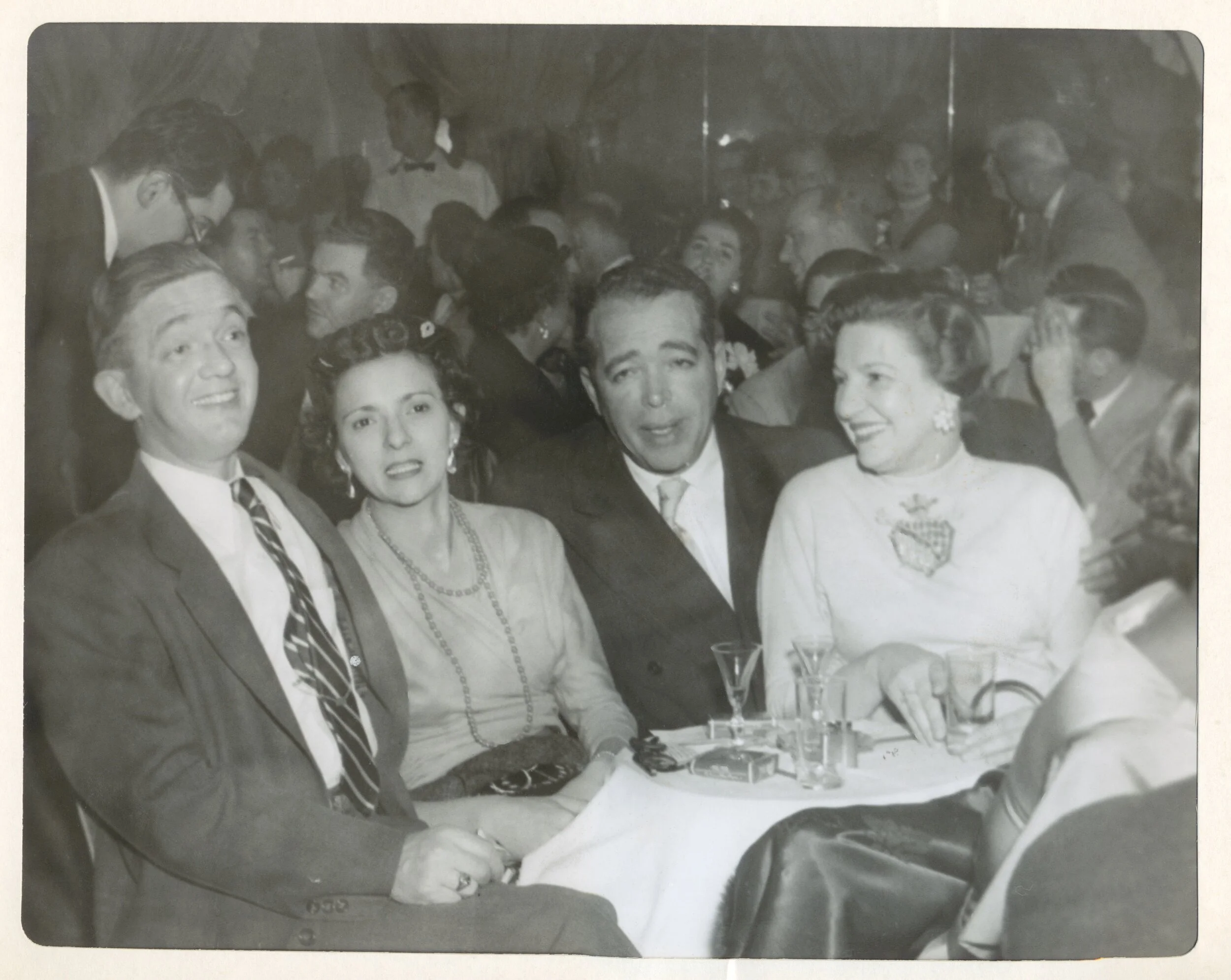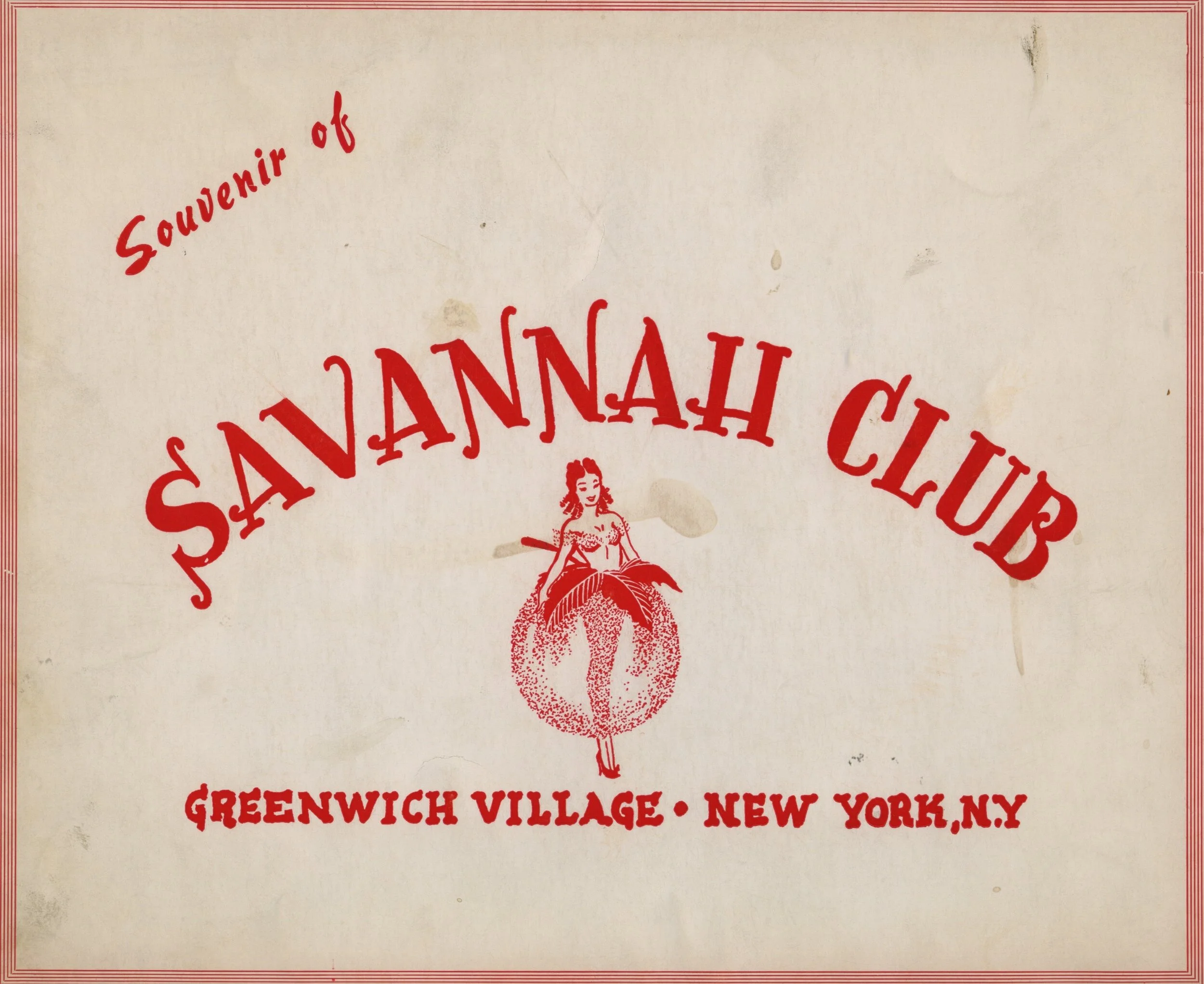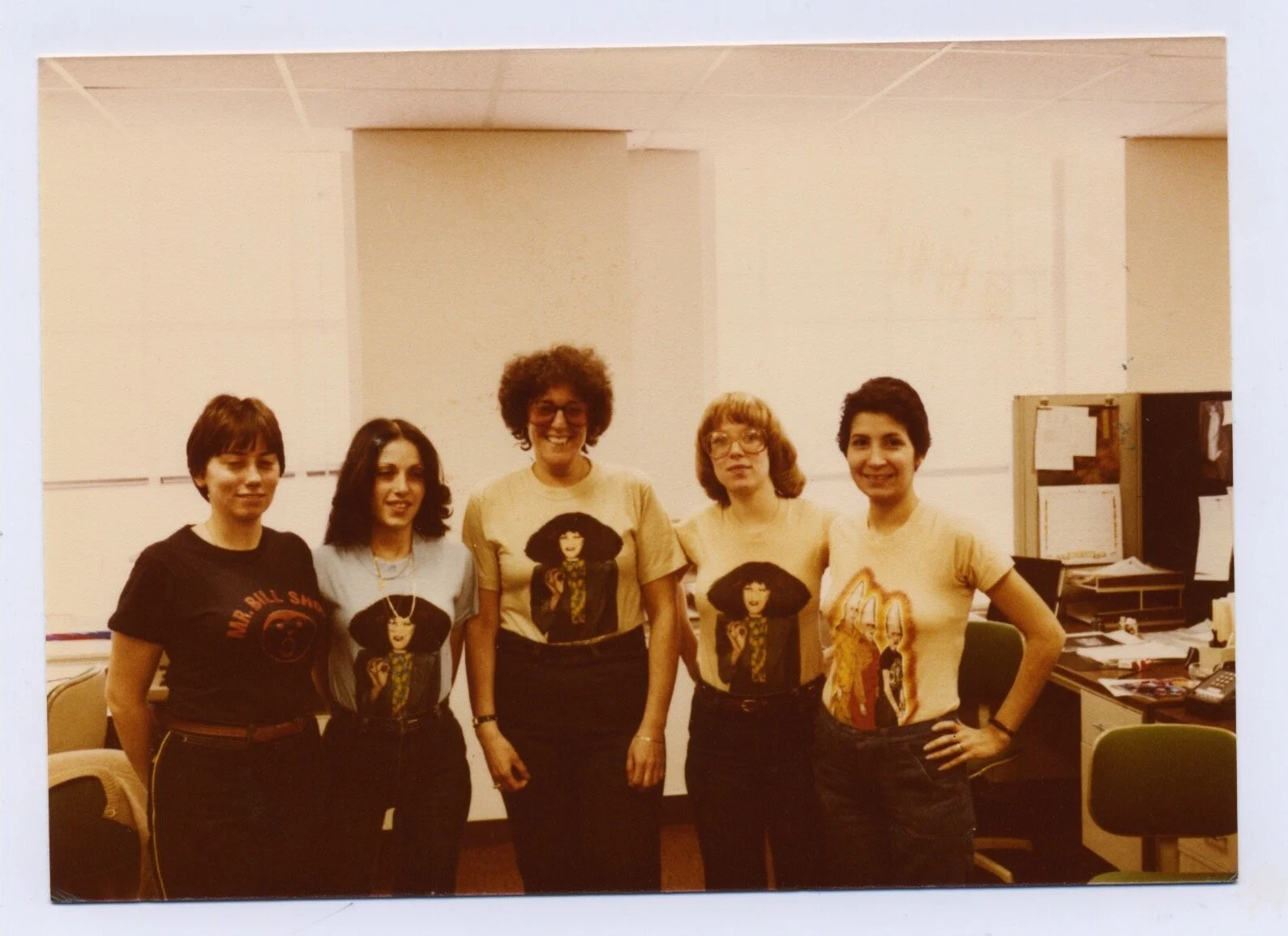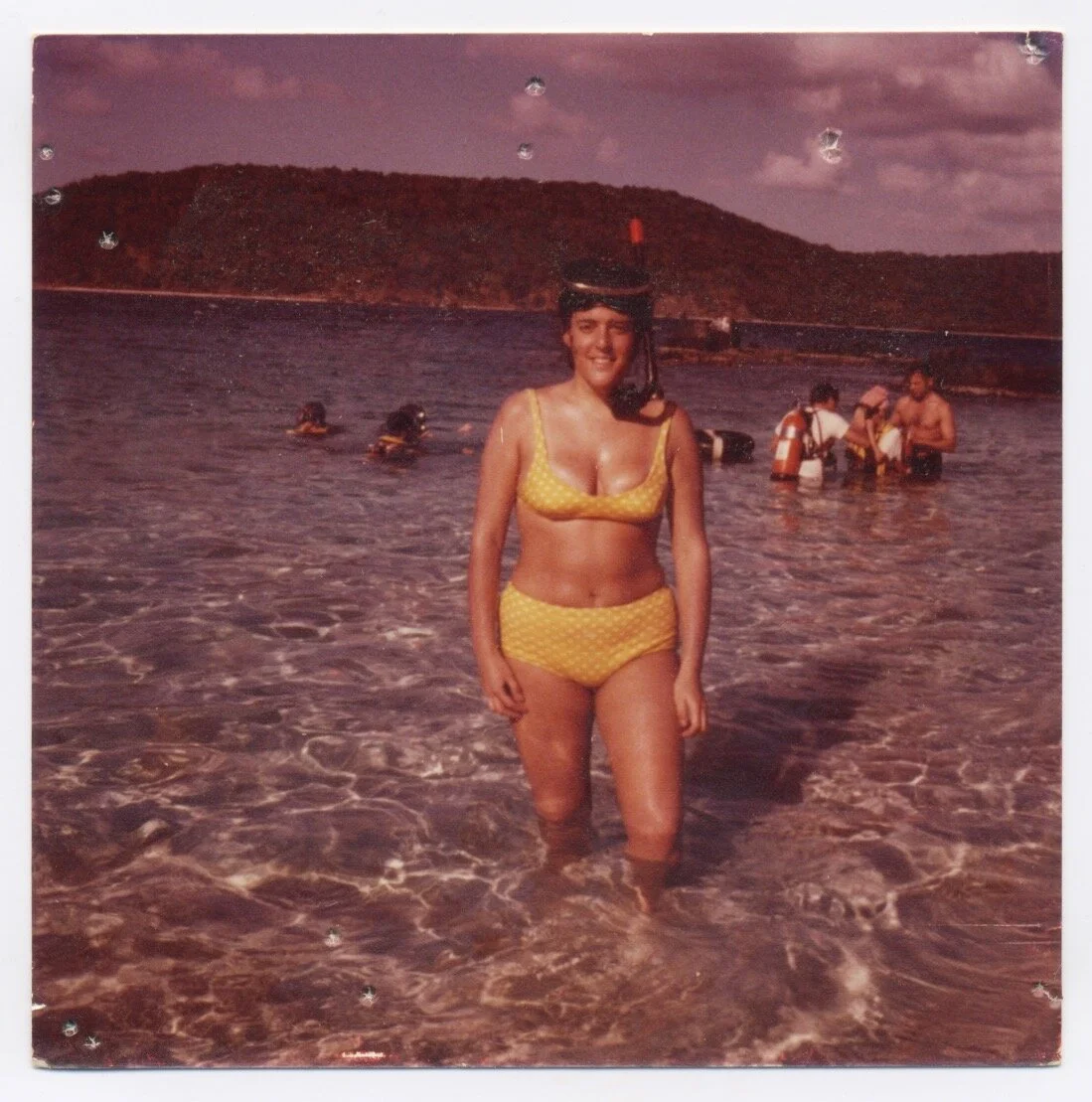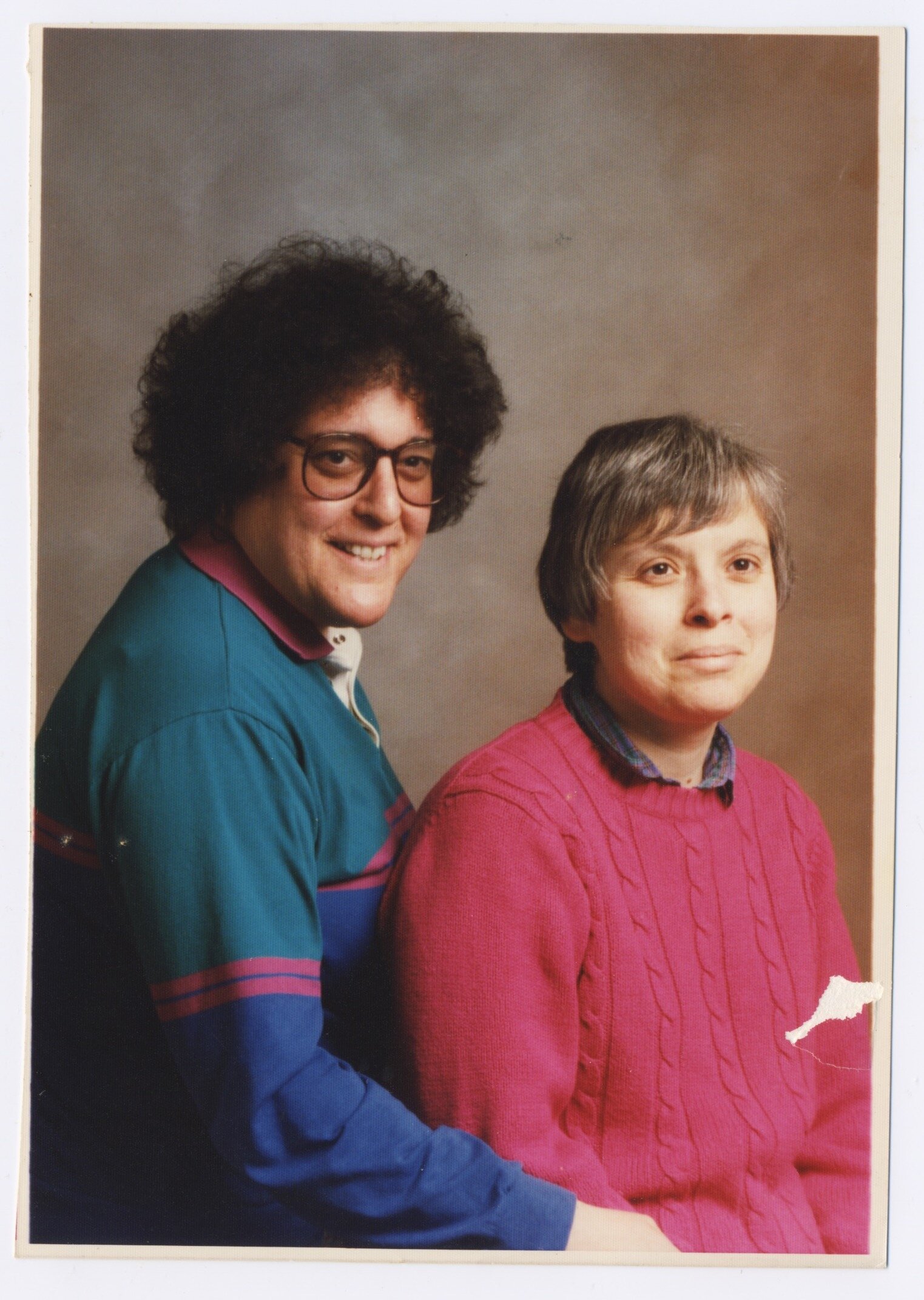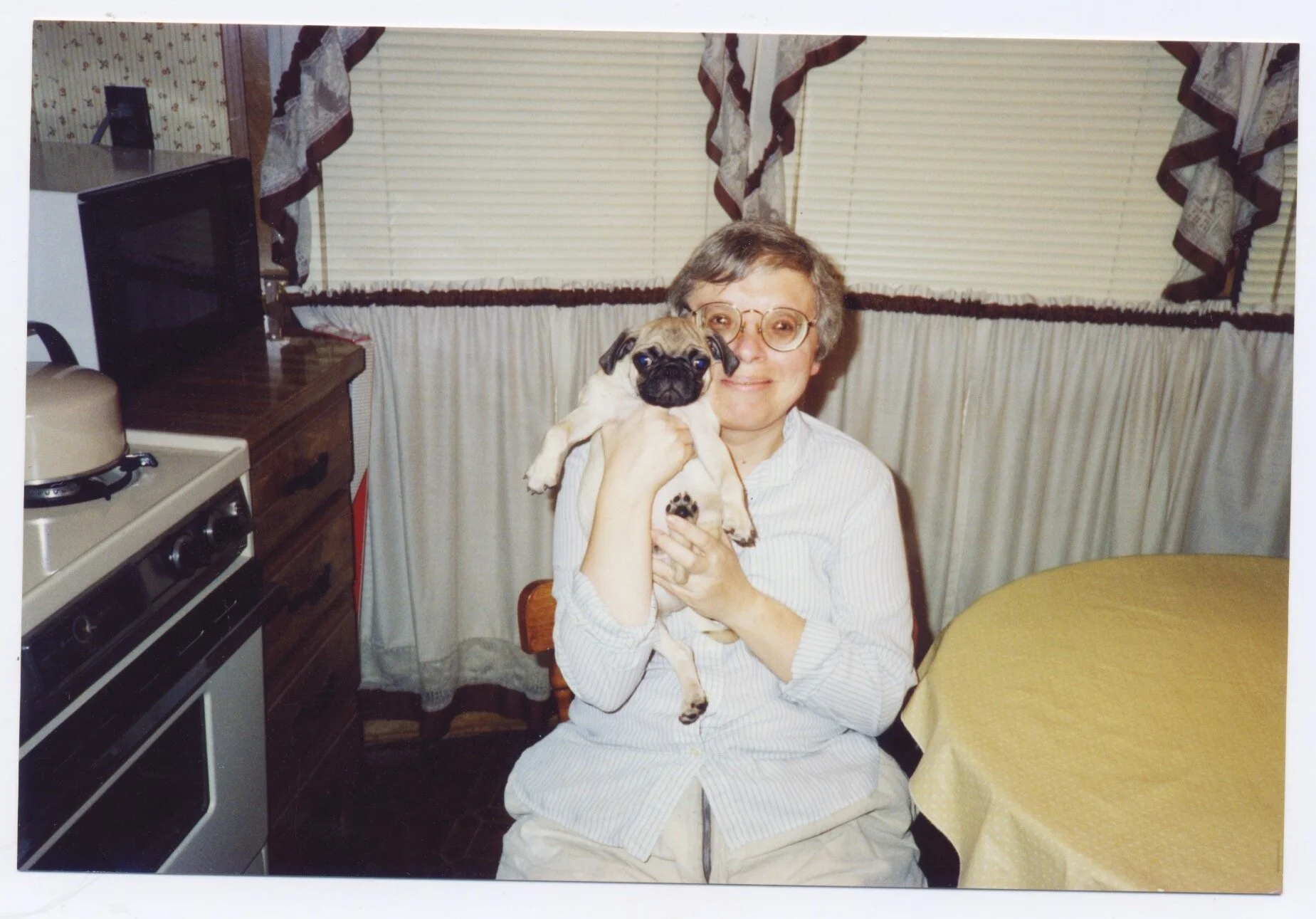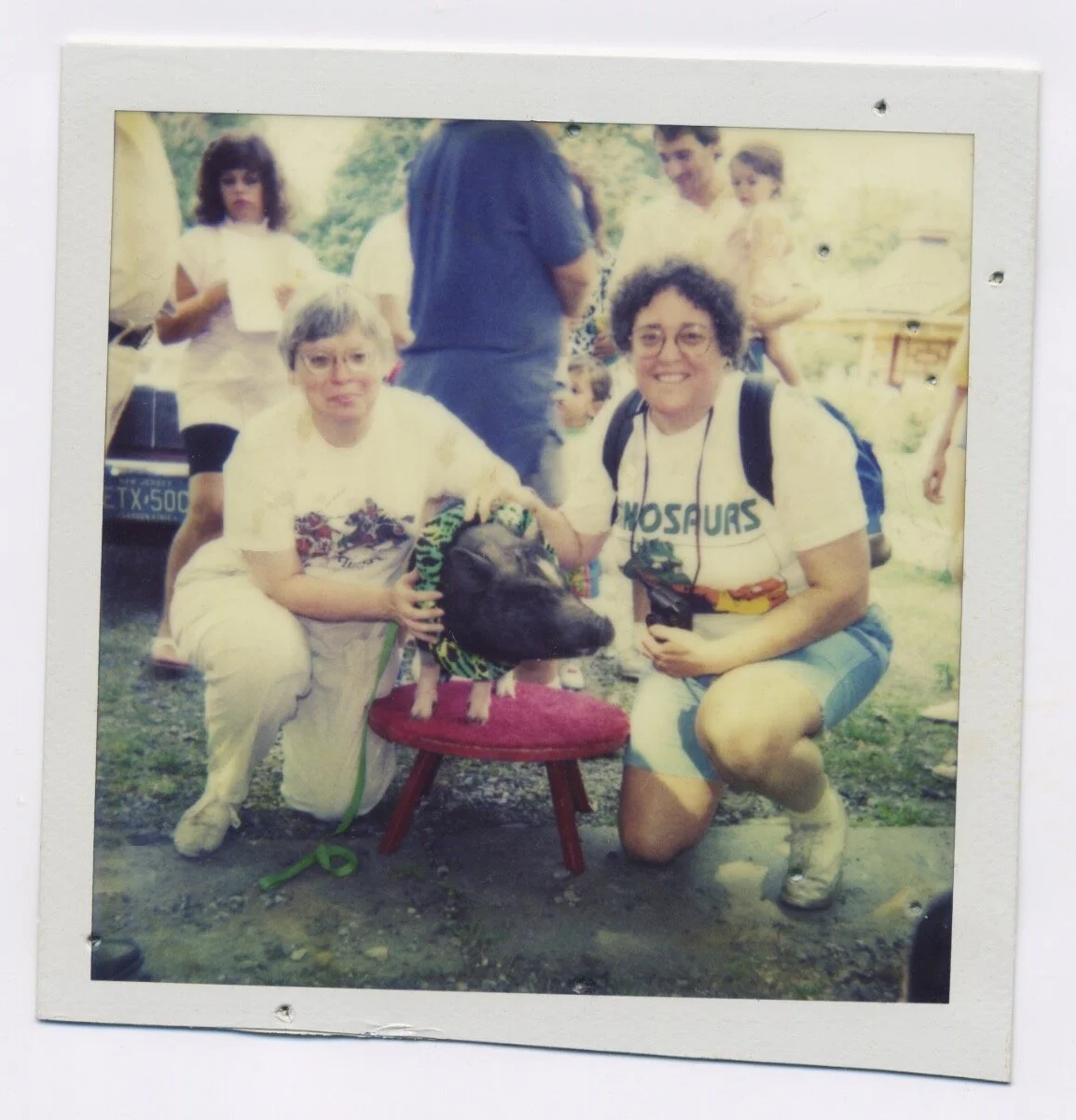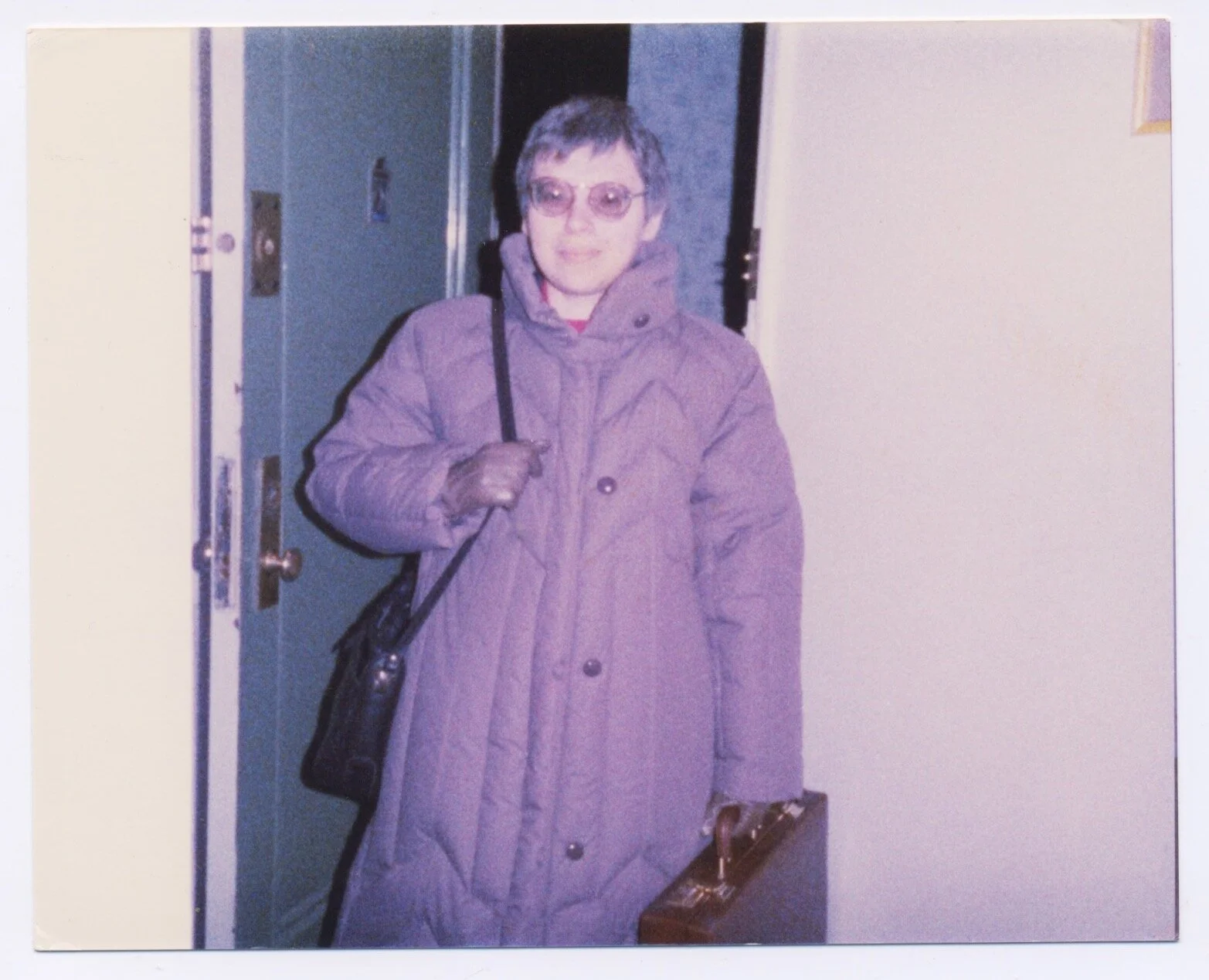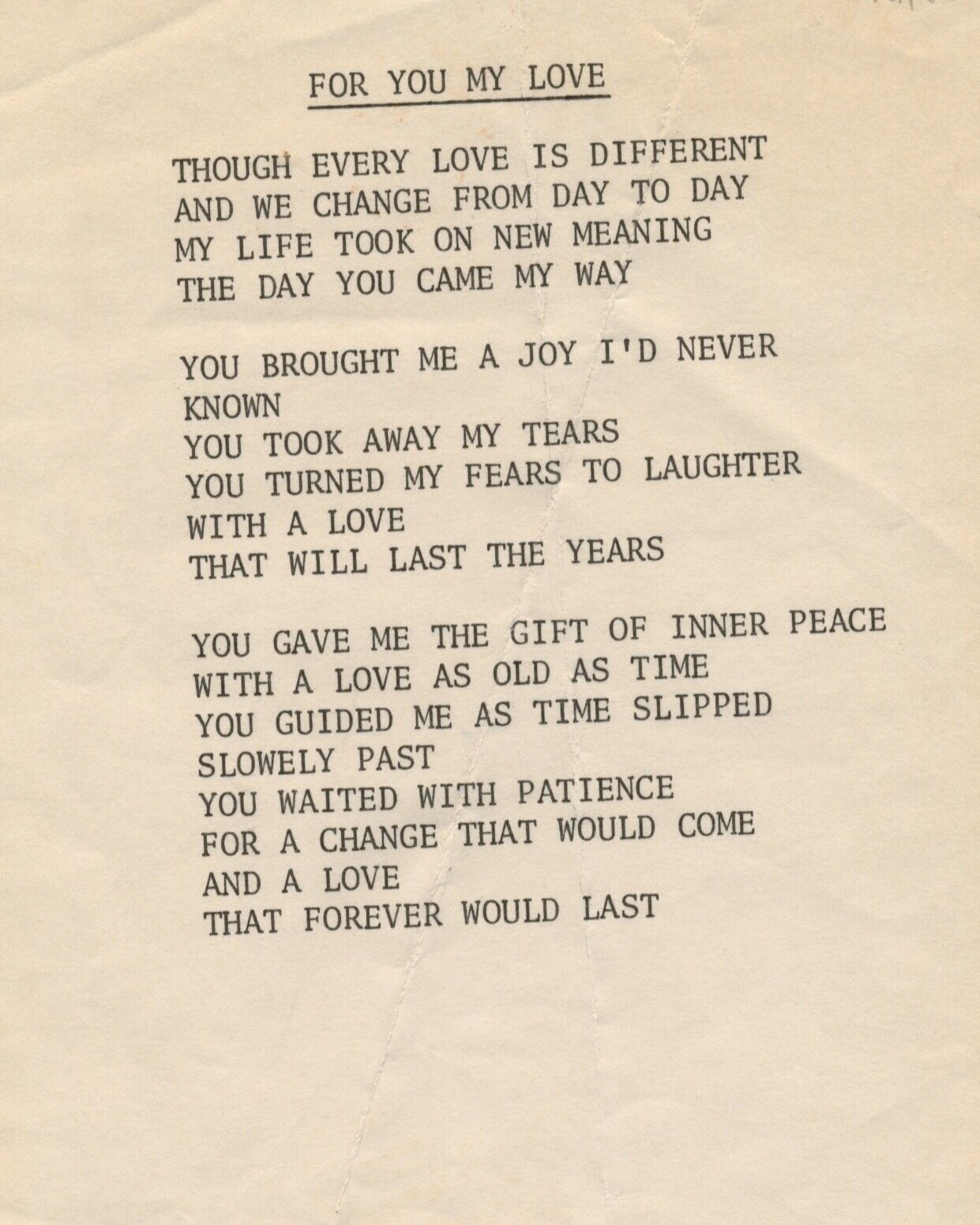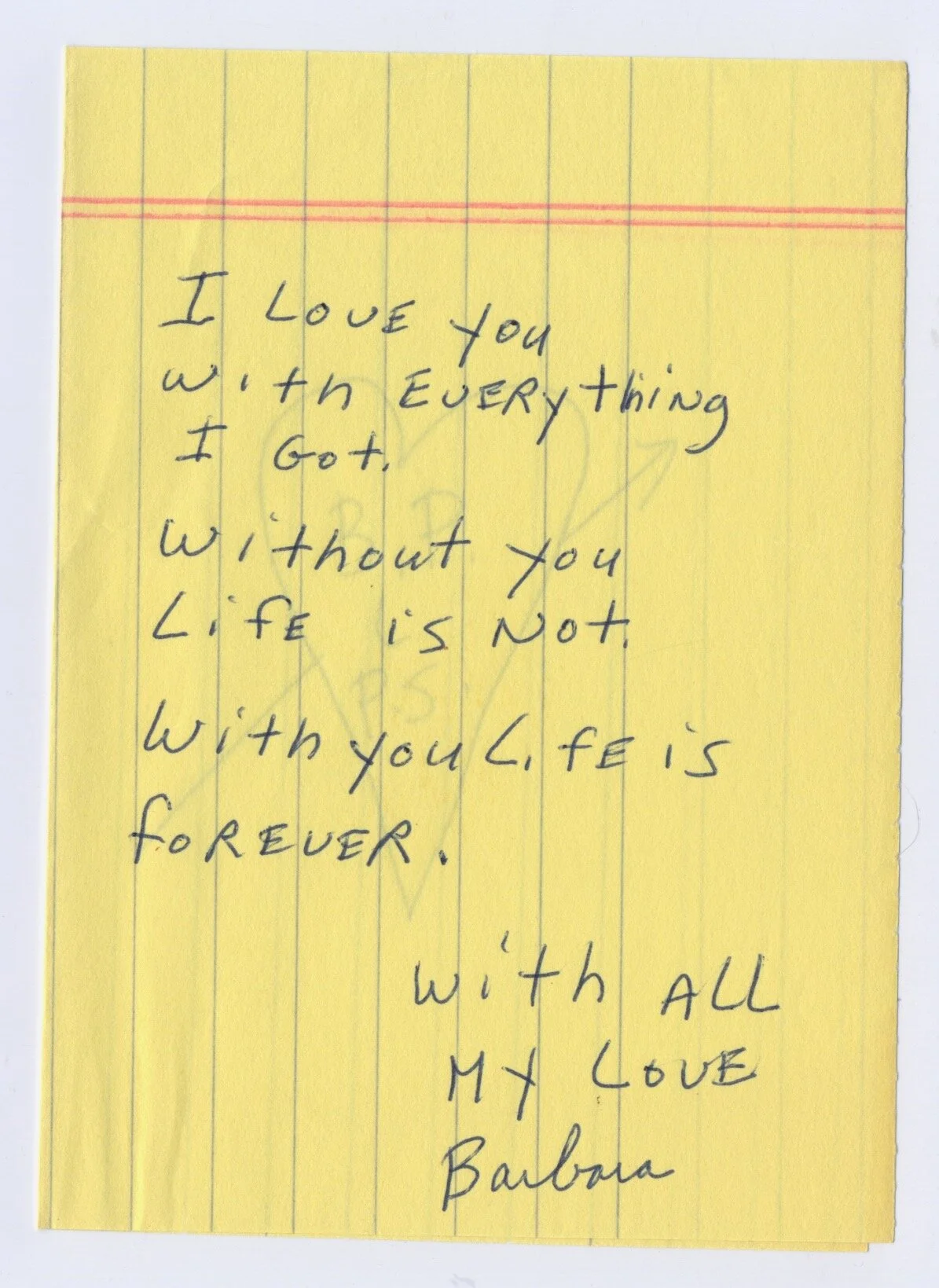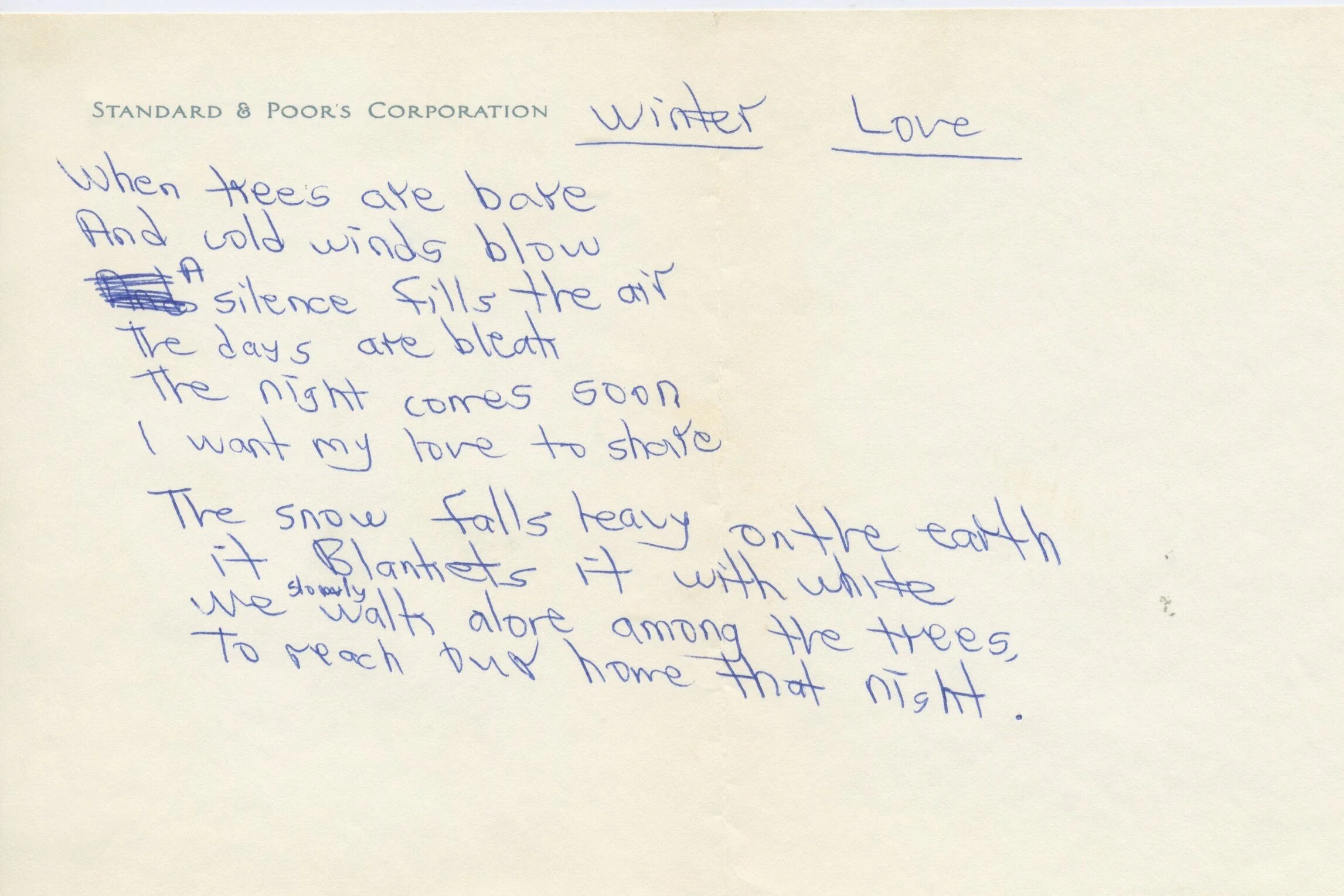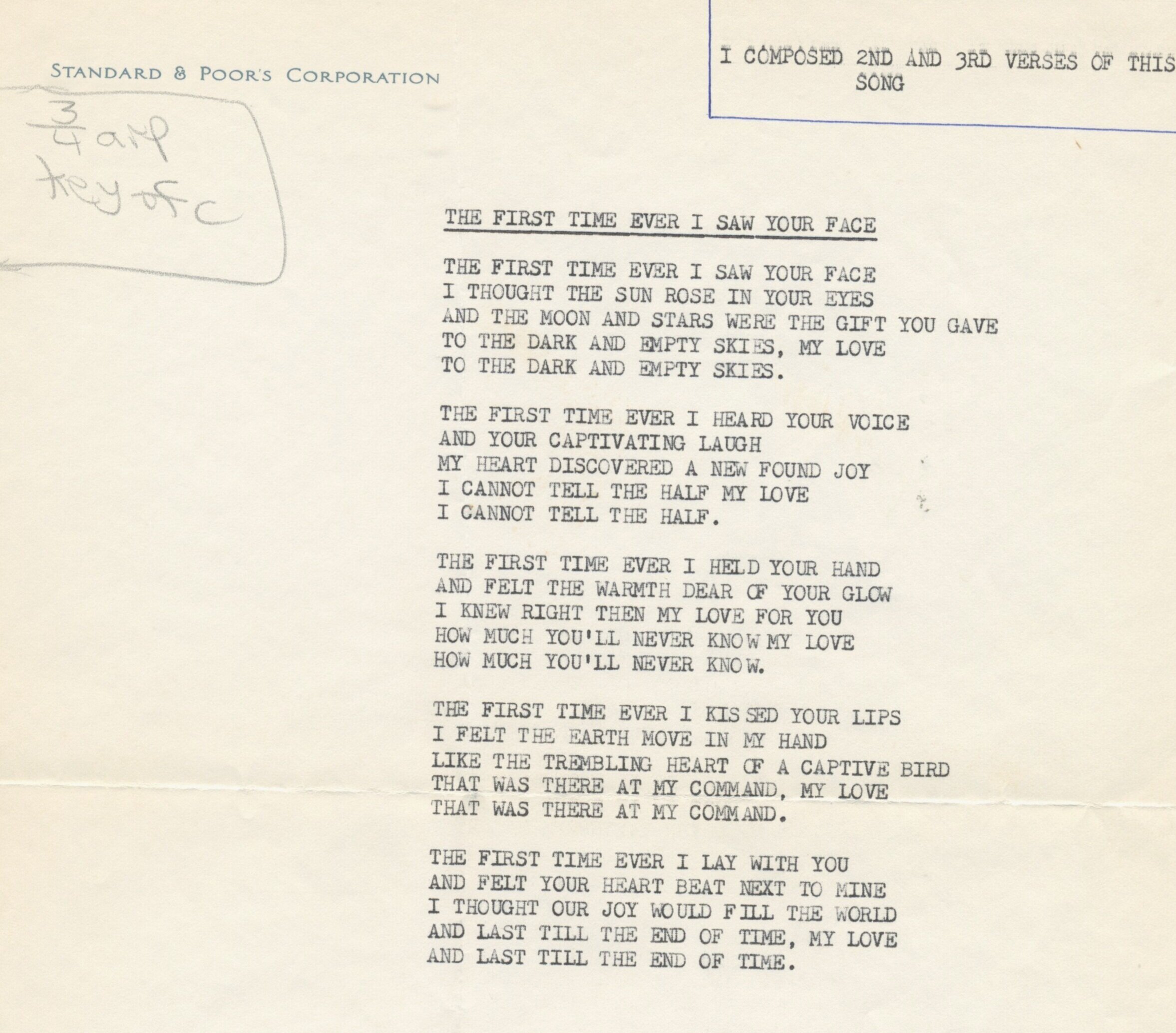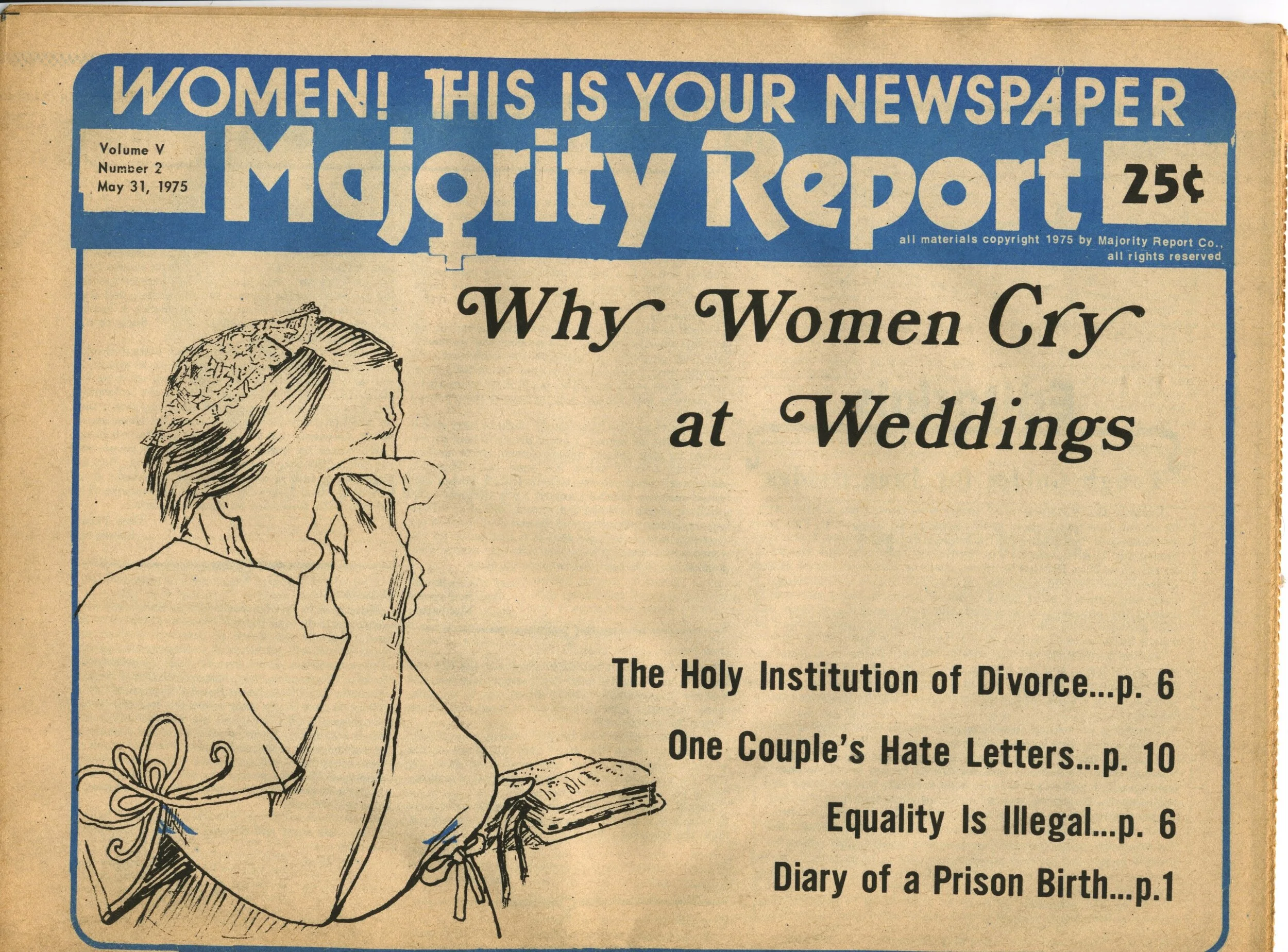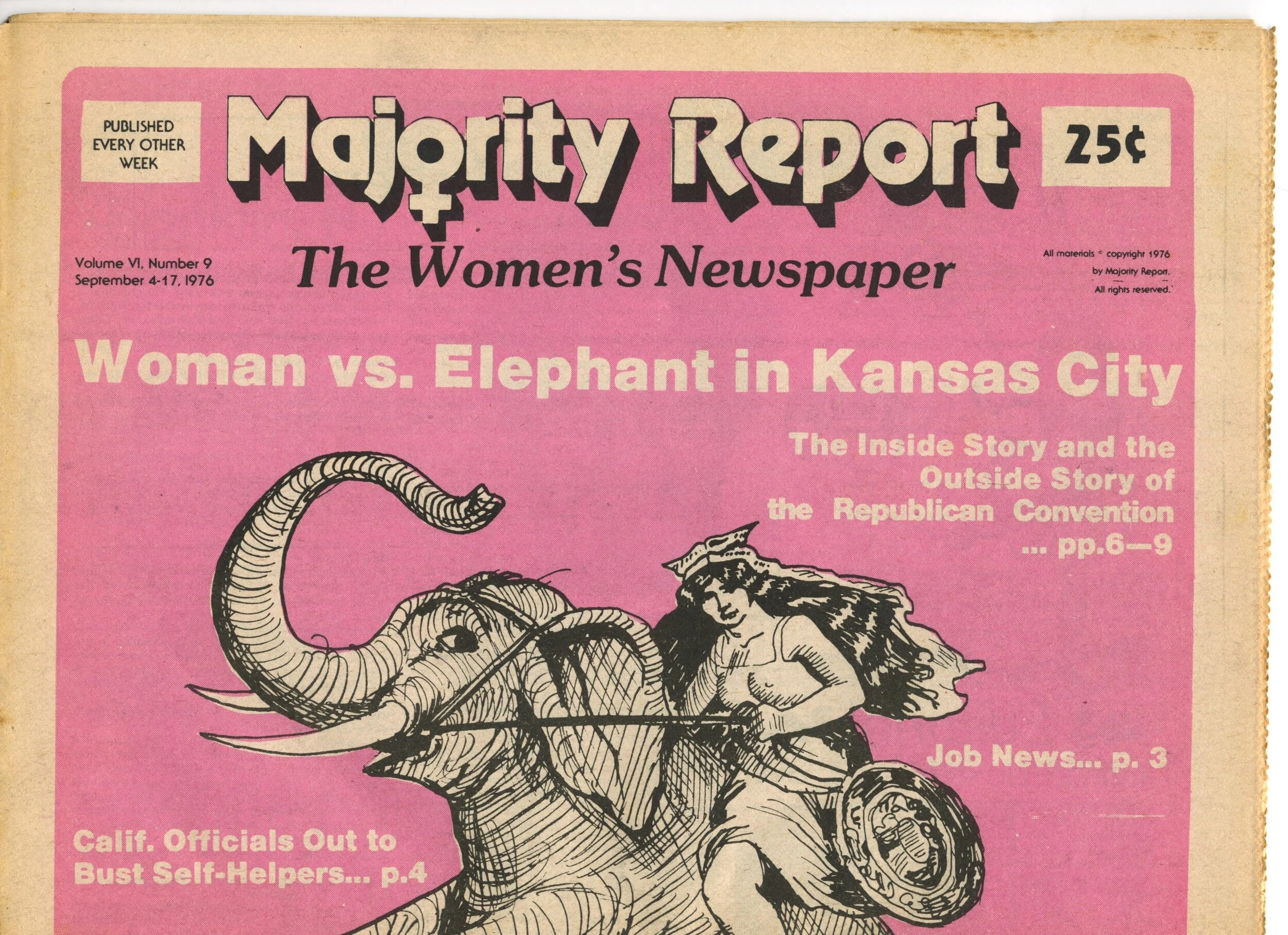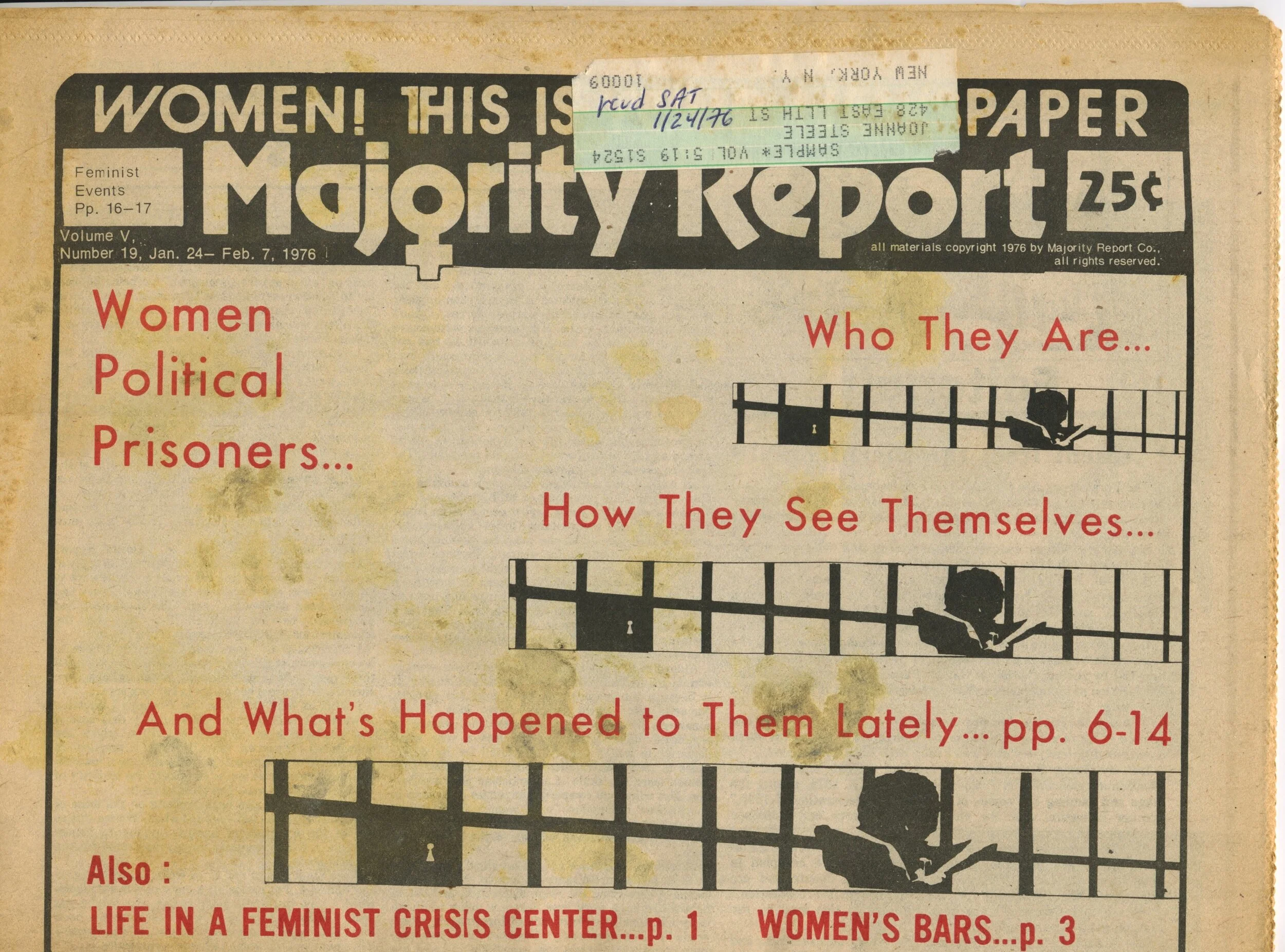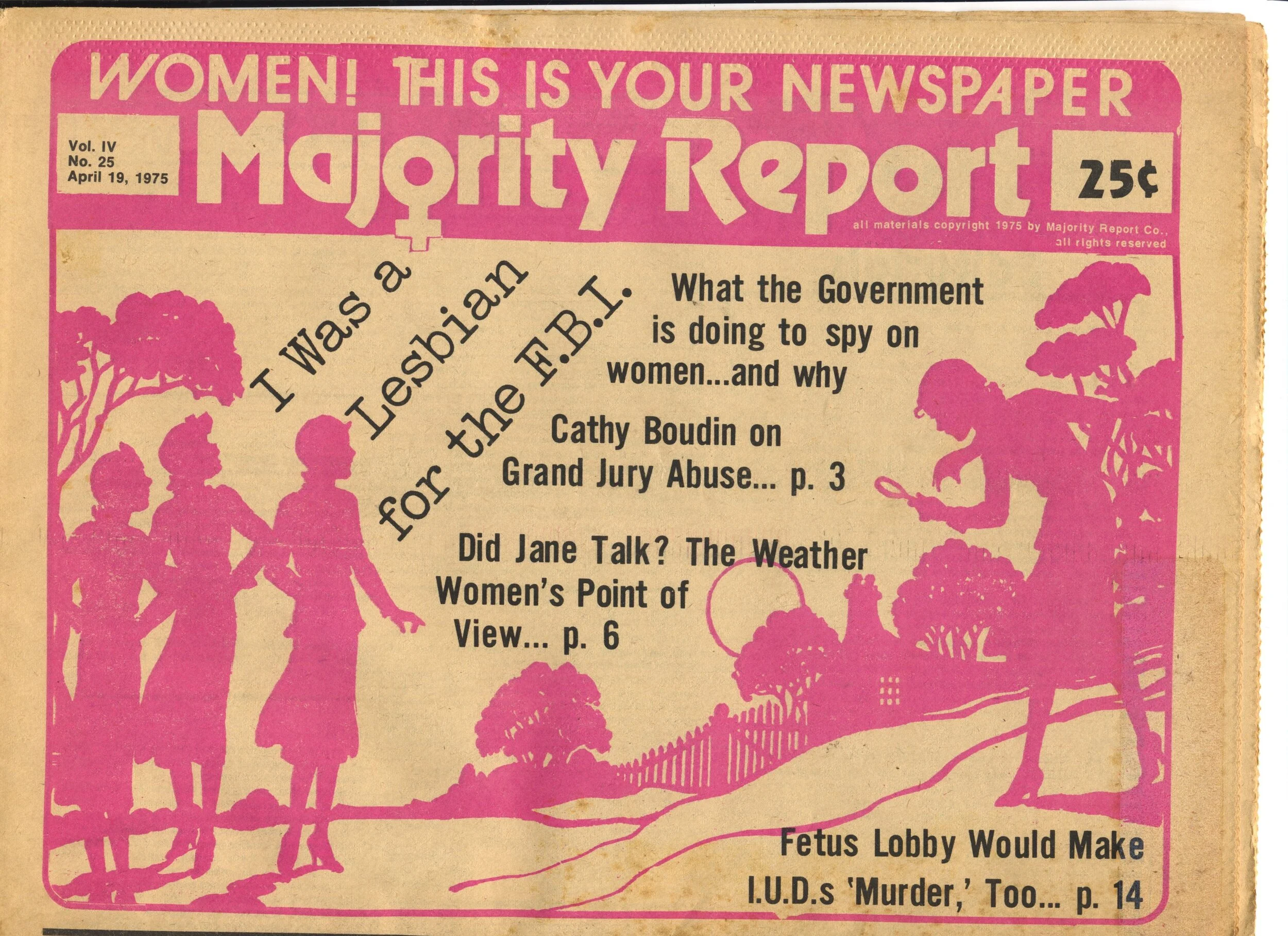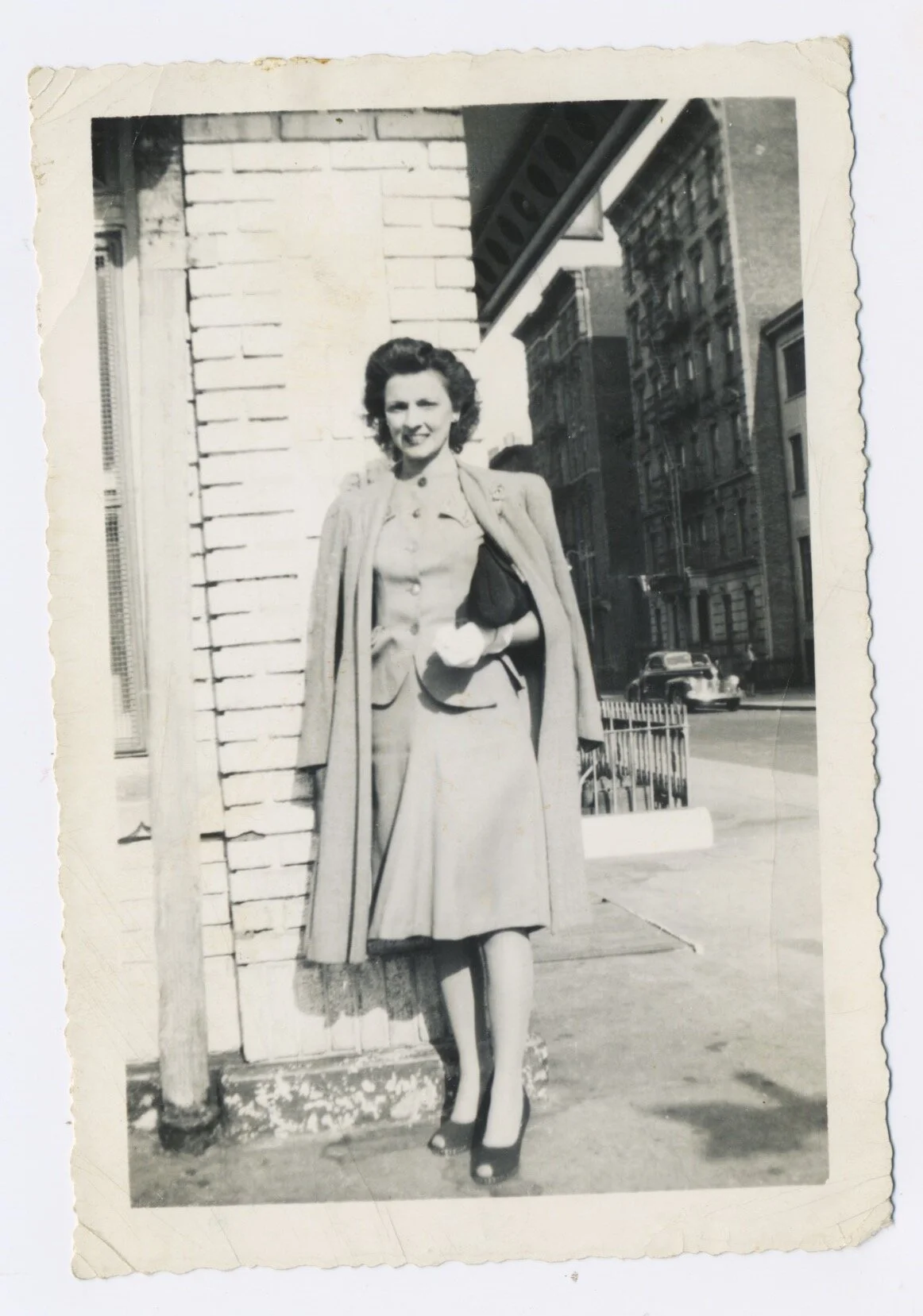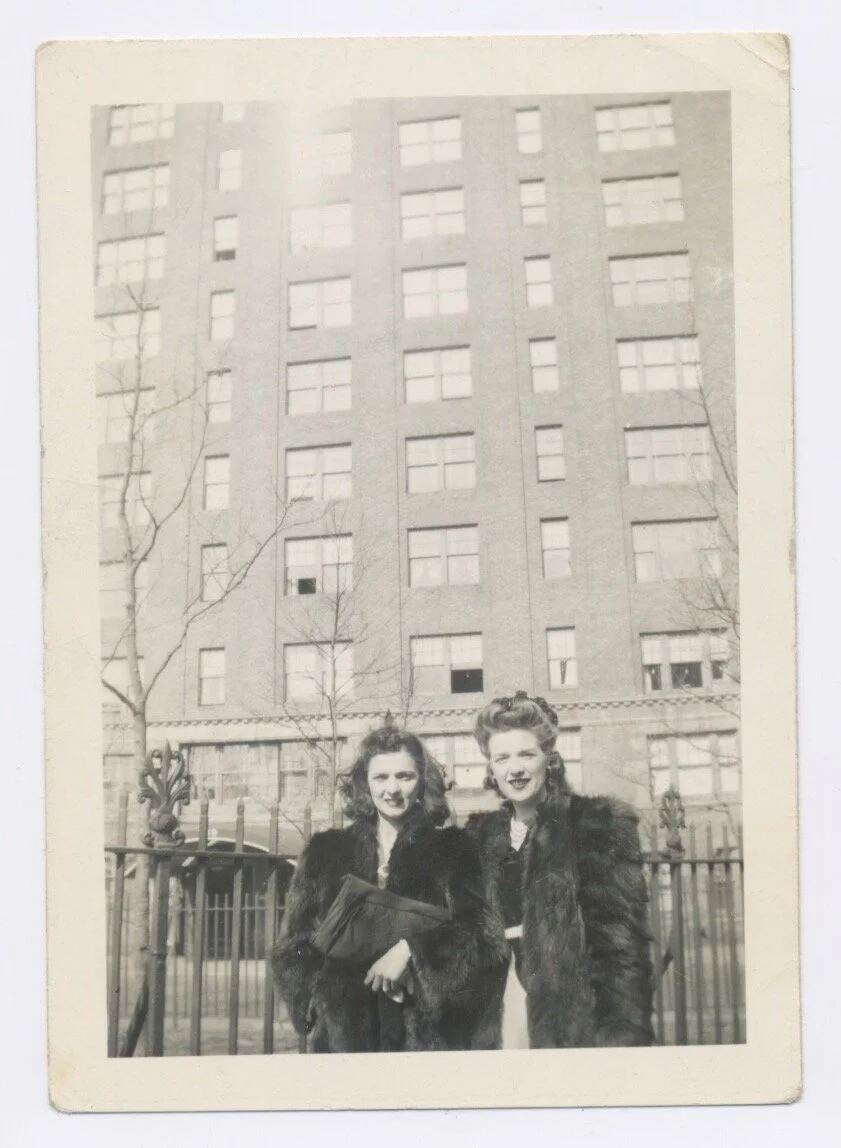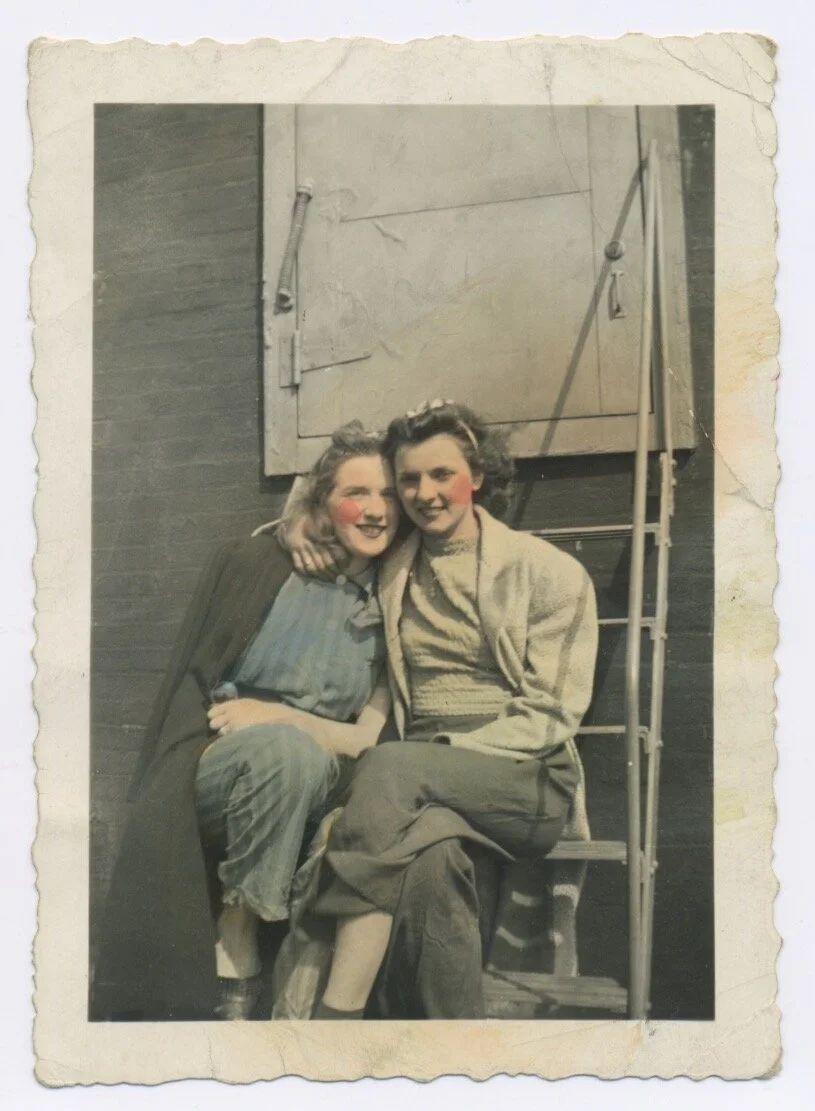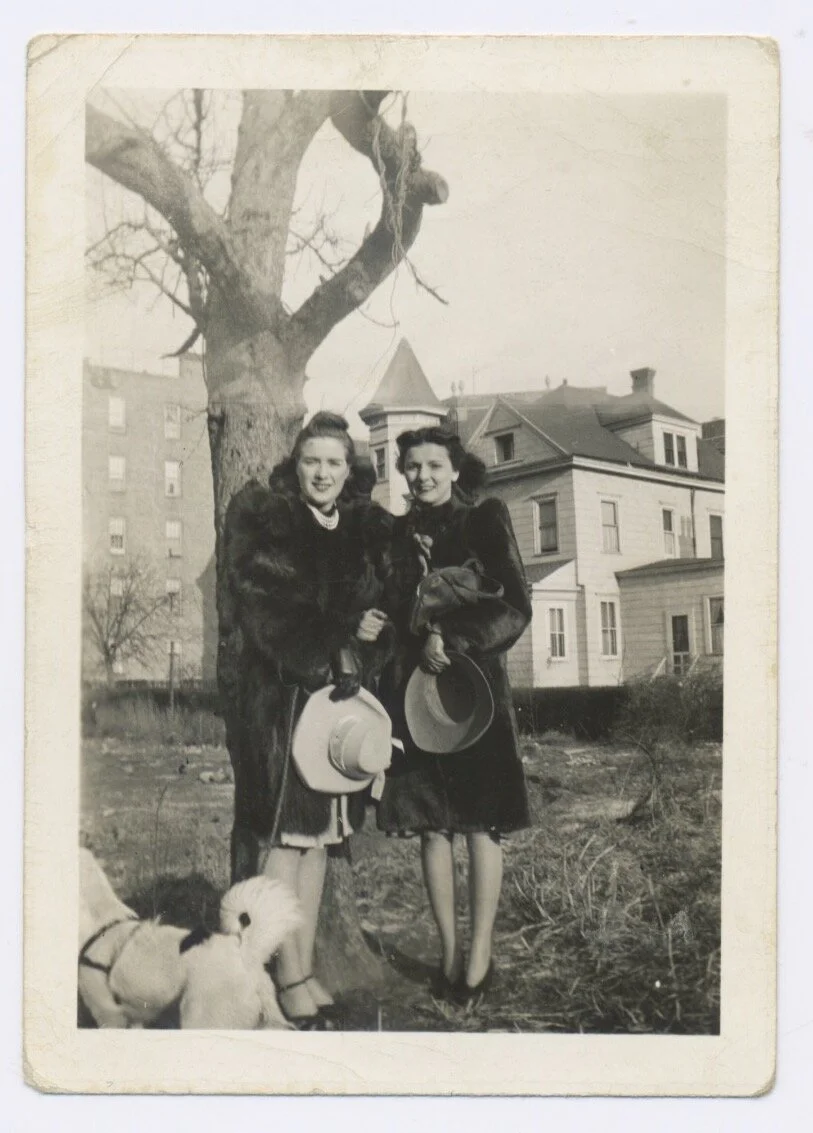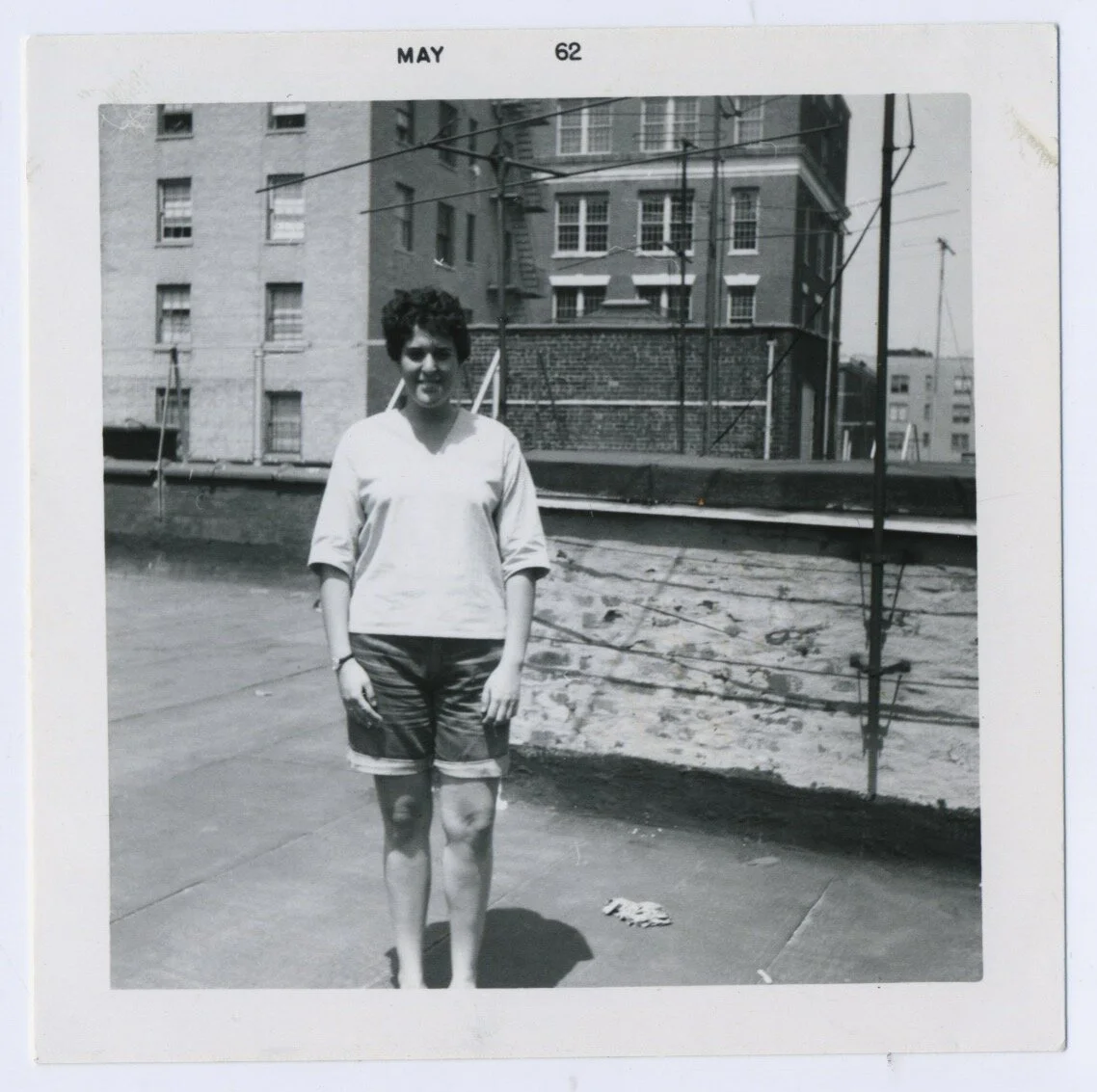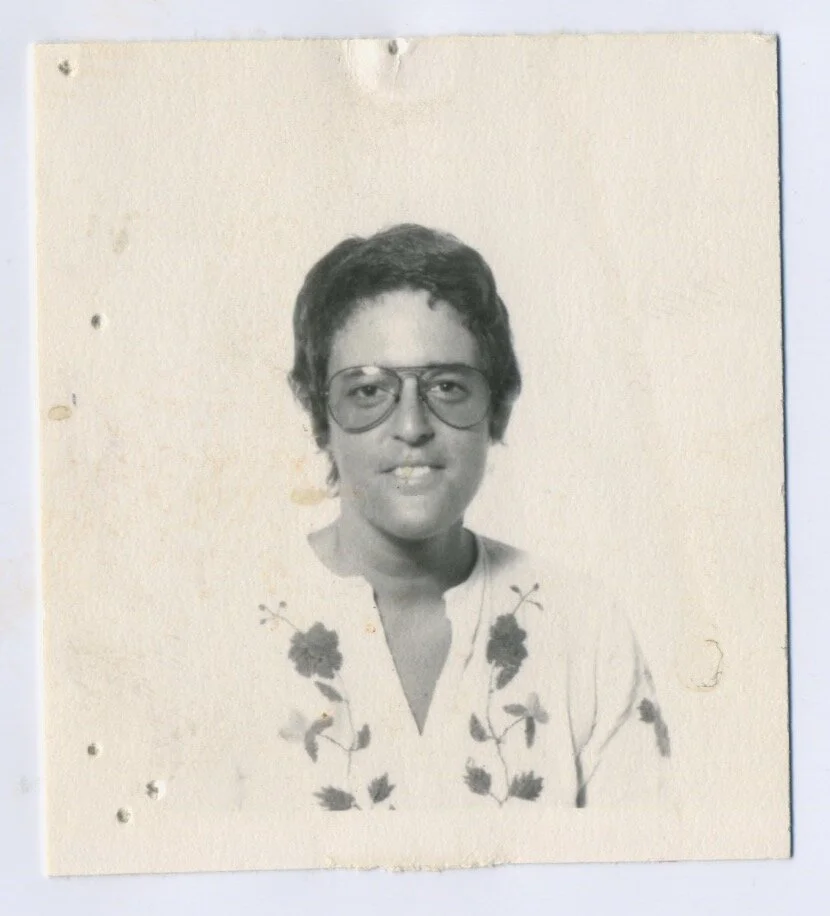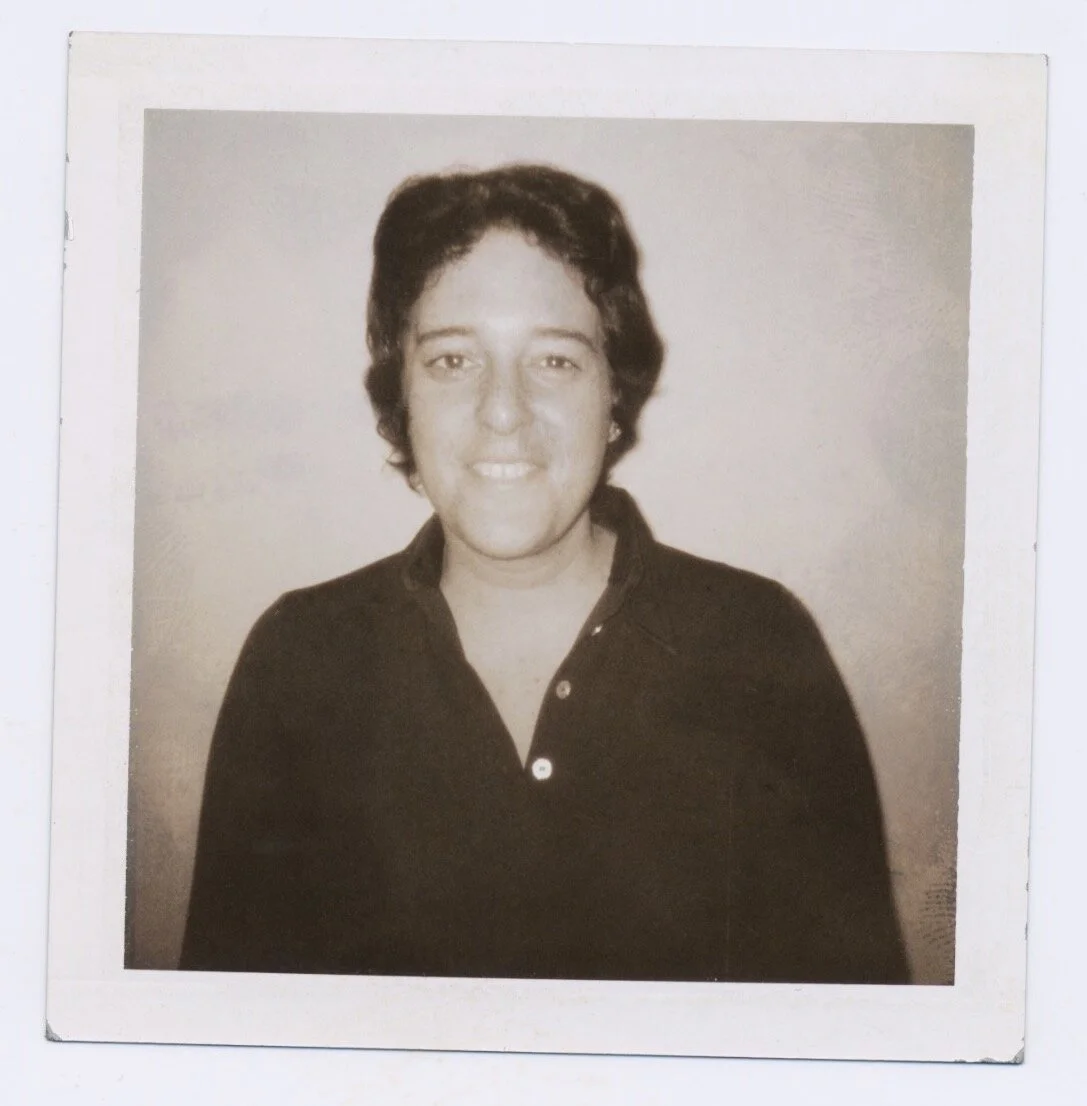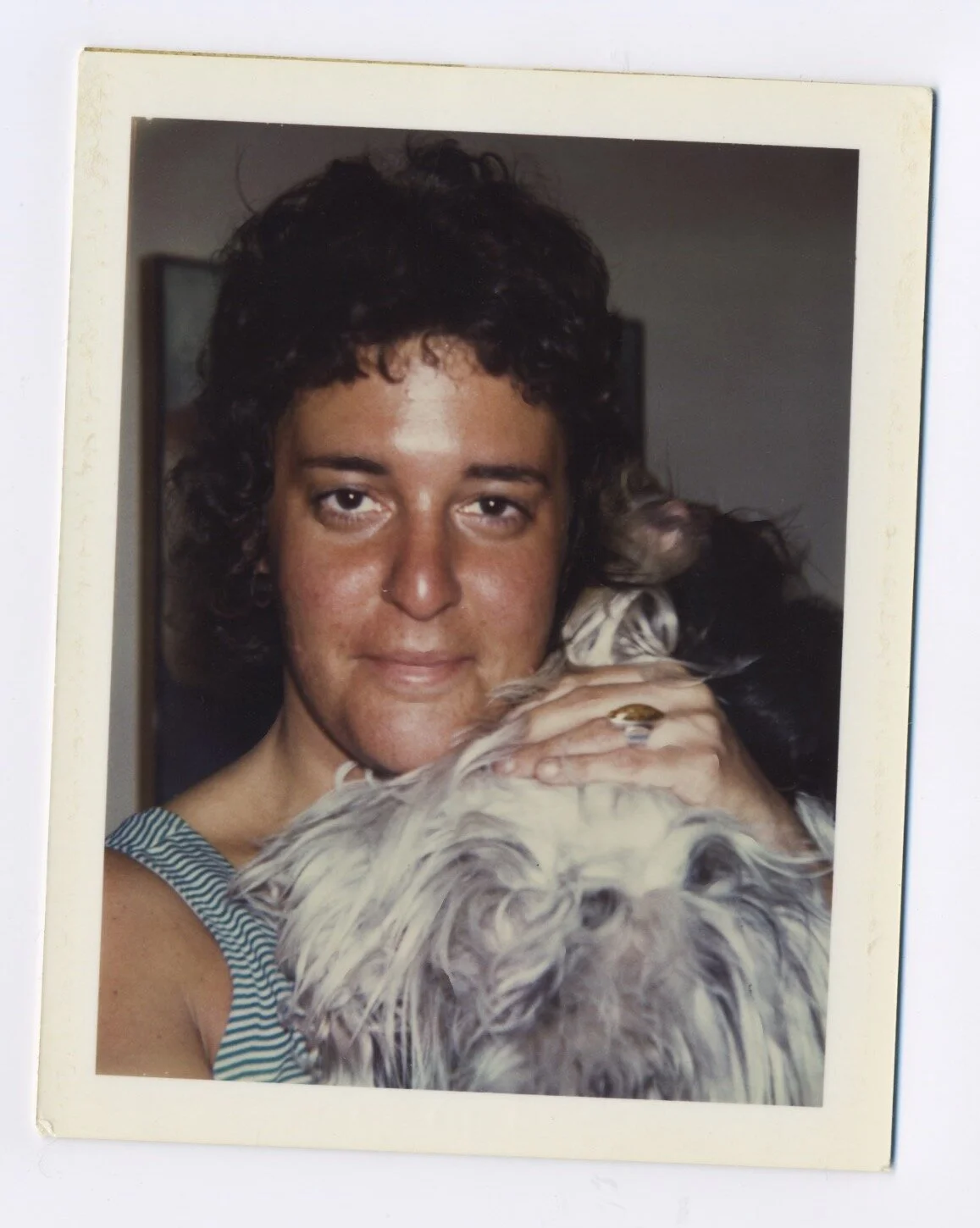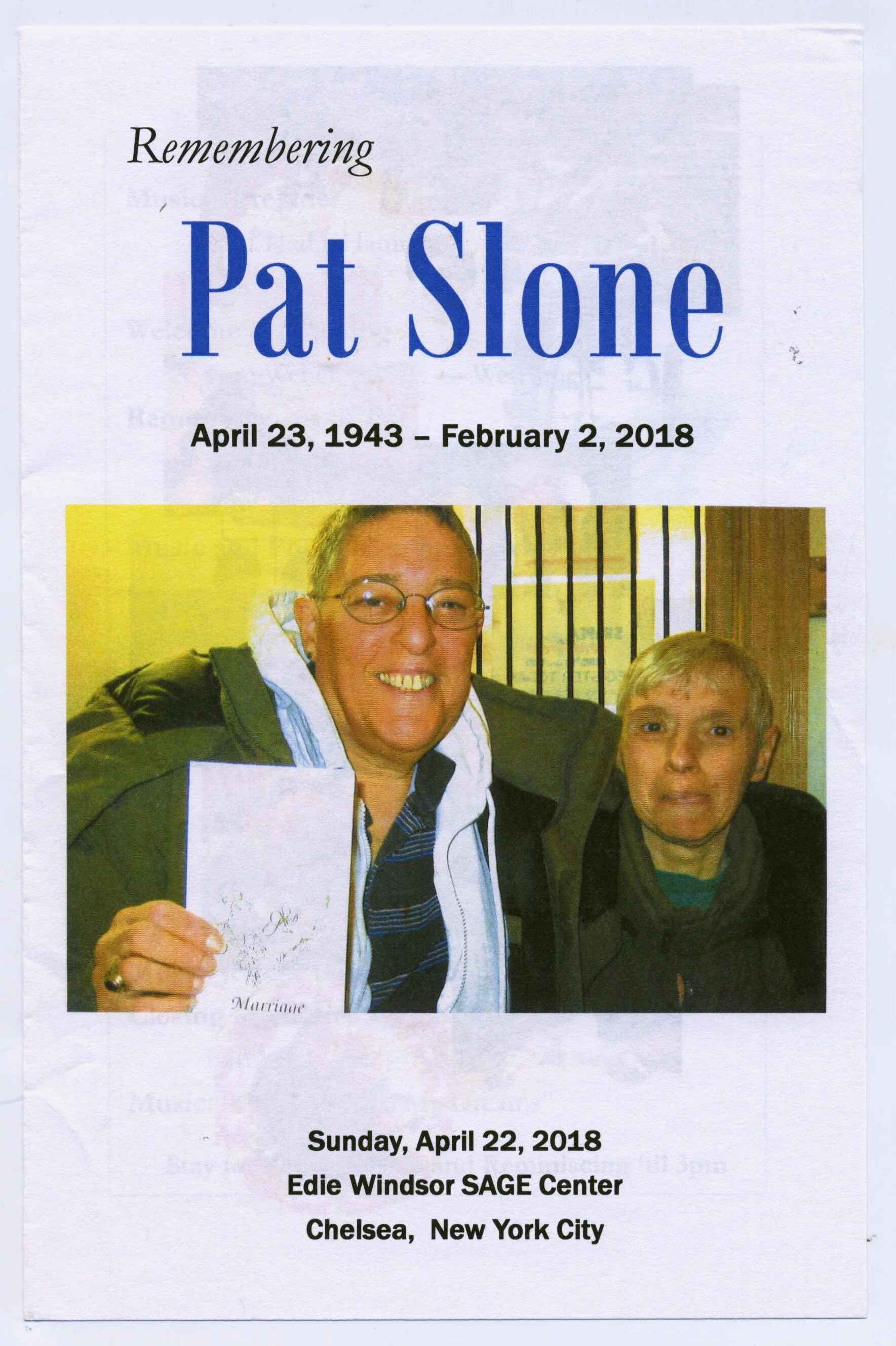Barbara Police
Barbara Police is a passionate, lifelong activist, a deeply committed volunteer at SAGE: Advocacy & Services for LGBT Elders, a Stonewall veteran, and a child of the Village. Barbara’s dynamic and colorful knowledge of New York City spans the decades. Her warm and generous spirit is matched only by her unrelenting desire to make space for sidelined lesbian, queer and trans stories. The following conversation was recorded on June 22nd, 2020 at 12pm by phone from Brooklyn, NY to New York, NY.
Gwen Shockey: The first question I usually ask is if you can remember the first place you ever were that was occupied predominantly by lesbians or queer women – it could be a bar, or a nightclub, or a community center – but the very first place where you really were around mostly queer individuals and what it felt like to be there.
Barbara Police: Ok! Hold on for a minute… I’m just shutting my door in the bedroom. Ok! Well! I can only say this: The first time wasn’t a bar, it was a restaurant called Pam Pam’s on 6th Avenue and Waverly. That’s where most lesbians were at in the late 1950s and early ‘60s. It was a place where you could have a hamburger, a coke… I think I was like the youngest one in there! The women were older and there were a few of the bull dykes wearing suits. That was a place that the police loved looking into every night. There were a lot [of police] that liked to go into the Howard Johnson’s on the corner of Greenwich and 8th Street. In fact they went in there a few times and beat up some of the lesbians. That was the ‘50s. And then when the ‘60s came they were not beating them up but they were harassing them. I was always around lesbians. My next-door neighbor and my mom’s friend who was a professor at Columbia – she was gay! This is a strange thing… She was a gay woman professor married to a Japanese man who was gay. What can I say! That’s the Village! (Laughing)
GS: Yeah! And that happened quite often, didn’t it? Where gay men and gay women would pair up to kind of help each other out?
BP: Sure! I don’t know when they met but probably after World War II. It was better for him being gay and Japanese. The village was a haven though and they lived right next door to us. We were in 1B and they were in 1C. We would look out the window in my mom’s bedroom and she’d say, “Joan are you going to play chess tonight?” They liked to play chess on Thursday night. Kasumi was a good cook and he would make the most delicious Japanese food. Oh my god. We would go crazy. I had to be, maybe, seven or eight years old. My grandmother and grandfather owned restaurants all over all over the Village and in Brooklyn. My grandfather had Louie’s on 3rd Street, and then he had Louie’s Swinging Door in Brooklyn and then he had Volpe, which is my grandma’s last name, on Kenmare Street.
GS: Wow! That’s amazing!
BP: Yeah! That was long ago though. My grandfather had really good friends who made it in show business like Jimmy Durante, Ginger Rogers, Bogie… When I used to go to my grandma’s house at 24 Charles Street where I was born she would have a big table set up and they would all be sitting there eating. These people – when they didn’t have a dime, when they were nobody – my grandfather fed them! So, over the years they all became friends. My mom and her sister and brother, they were all exposed to these people long ago before they even became famous. Tallulah Bankhead used to sit on Waverly Place half-cocked out of her mind saying, “Where’s my bourbon!” You know… So… It was a hoot! I used to see Steve McQueen – he was a delivery boy for Francis’s Typewriter on 10th Street – way before any of these people got famous! My dad had a gas station at 15 Charles Street. He had Peggy Lee and Ray Peterson… It wasn’t a matter of being a celebrity or not. It didn’t matter and most of them didn’t even have a dime in those days. It was a different world.
But the first time – I guess I could say that it was Pam Pam’s! That was very early in life because there were lesbian bars but I wasn’t old enough to go in.
GS: What year were you born Barbara?
BP: 1949!
GS: Did your grandparents immigrate to New York?
BP: As far as I know my grandma was born here. I have her birth certificate. She was the youngest of seven and she was born in 1896 at 13 Spring Street.
GS: Wow!
BP: Yeah! And she was the youngest. I think they were all born here because they had a sundry store right where the Holland Tunnel is. That was my great-grandmother’s property.
GS: Sorry, what type of store did you say?
BP: A sundry store! A sundry store was like a – not a drug store – like a general store! They sold oats for the horses. Ok? In those days they called it a sundry. I think that it was the Delise family… That is the family that came over from Italy and France. My grandma’s name was Philomena Delise but when she married my grandfather, my grandfather said, “You’re no Philomena! You’re a Maimie.” And that stuck to her because she was too rough. You know? She and my great-aunt May used to wear little Berengar’s in their stockings because they had restaurants and speakeasys!
I don’t know if I told you but I’m writing a book! My partner in crime, my co-author, Greta, she’s a Yale professor. She’s writing it with me. She had the Coronavirus! So, we had to take some time off. We’re getting back to it probably in the next few weeks. We got a lot done in the first two chapters and a literary agent is looking at stuff right now and I’m talking to a publishing company so we’ll see what happens.
GS: That’s fabulous! It sounds like you really grew up with some strong women in your life.
BP: Oh yeah! My grandma… She was a hoot! I mean, I have pictures here… She’d wear a bathing suit and she had big breasts, put her cap on, and she’d be in the middle of the water in a row boat! She was a hoot, you know? She was tough! And my mom! My mom was not as tough but tough. The men were not tough. My grandfather was so quiet but he loved to cook. Oh my god. His cooking! And the story goes: how he learned to cook is from a man called Mosca who was the personal chef of Al Capone. He would come to my grandfather’s speakeasy. When he went to jail he said, “Louis! You want my cook?” And he took him and he taught him everything! My mom and my grandpa were the main cooks in our family. My grandmother didn’t cook. No way. She was a business woman, that’s it! On my father’s side too.
GS: How cool! So, you said your grandmother ran a speakeasy – was that during the 1920s?
BP: Yes! My mom was born during that time. I’m going back through the history of my family to show the liberalism in my family! Nobody cared about who you were, what you were – that’s the problem when I sit in groups. I hear the Midwesterners – I hear them say how bad things are – and I feel kind of guilty! Because I didn’t have that. You know? I had best friends who were black and when one of my friends, Ronnie Butler, her mother was a vice president for Forbes magazines and one of the first black women to do so! And when her mother would go on trips Ronnie would stay at my house! When we were little kids at my house she’d have to do the same things I did! There was no difference. It didn’t matter. You know, when I look around today at what’s going on it breaks my heart because I had none of that. I have to be honest. I had none of it!
GS: Were your parents involved politically?
BP: I have a certificate and it says that in 1946 my mother was an inspector for the voting polls! In 1946! And my grandmother was a suffragette in 1920! I have a whole bunch of stuff here – documents about all of this and pictures. We’re going to put a lot in the book. A lot of pictures and different things. It’s not only going to be about the family but the neighborhood, the Village, the West Village, and what it did for people and how it operated! It was an Irish Italian neighborhood mainly but we had Jewish people and we had Chinese people we had black people and it just didn’t matter!
GS: You were growing up in the Village in the 1940s and ‘50s – what was it like to be a kid there?
BP: In the ‘50s it was my Camelot. In the ‘50s I was a little kid. ’58 when I was nine years old I’d say: Mom! I’m going over to Rosie’s! She’d say, “Alright! Bring me an ice cream cone!” I’d say: Alright! And I’d go over right on Greenwich Avenue. I’d say: Rosie! I need ice creams cones but mom didn’t give me any money! She’d say, “Don’t worry! Take the two ice cream cones! And take this to your father! It’s a malt with an egg in it! He needs it he’s working hard!” No money! That’s how it was. If you didn’t have money for the doctor the doctor would come into your house, the doctor who brought me and mom into the world, and there was no specialty. They knew you since you were born. So, if they heard a wheeze, “Here! Take this.” Then he’d say, “You come over. You’ve got to get your physical.” He was right over on 10th Street and 7th Avenue. And all he would say was, “Rosemary! Put on spaghetti!” That was his payment. He’d sit down with the family and they’d eat. That’s the way it was.
GS: Wow! That is just a whole other world I can’t even imagine.
BP: It was. My mom and dad’s doctor was a black woman called Carmen Grange who was the first black woman in Saint Vincent’s. She lived at 15 Charles Street before she passed away some years ago but she took care of my father until the bitter end. It just didn’t matter! And it was the same with the gay community. I went to school with Spanish kids, black kids, you name it! If you looked at my pictures from school you’d see all kinds of people and that’s part of my history and I’m proud of it! I’m a really proud Villager.
GS: I can’t imagine a better environment to come of age and to be exposed to so many different kinds of people and to have no stigma be the norm – you are so lucky to have had that!
BP: Well, that’s why I want to give it to others! Because I hear the younger generations at SAGE – and I’ll be thirty-nine years in October with them – I’m the oldest member now, is that I hear from them horror stories that they got thrown out by their parents… It’s like another world! It’s like something I can’t imagine! I mean, in my world in the daytime as a child on Saturday morning we’d go to the movies and when we hit our teenage years my best friend who’s still around, Susan, we used to have to take our carts and go the A & P shopping on Christopher Street for our mothers and fathers. So, they taught us that we had to have responsibility way before we were adults. My mother and father never talked to me in kid talk. When I was four years old my mother would say, “Are you going to sit with me and watch Thomas Edwards on CBS news?” I’d say: Ok mom! They’d go to union rallies where Union Square is. I was four years old! (Laughing)
GS: You would go with them?
BP: Yeah! In a way we were red diaper babies. There were a lot of kids in the neighborhood who were going to rallies at five years old!
GS: Wow, that’s so great! Were your parents involved in Civil Rights actions?
BP: We all were. My grandmother – when it came about – she called her lawyer and said, “What can I do for these people? What can I do?” She was rough, but a heart of gold. She said, “What the hell can I do for these people?” She sent money, she didn’t want recognition – this is the way they were! Especially if it involved kids or animals… My father would bring all sorts of animals home because they would walk up to his gas station on 15 Charles Street! He would carry them home and my mother would say, “Put them in the bathtub!” We would wash them off and everything! We’d find homes for them and if not they would stay with us! Birds, cats, dogs, mice…
GS: It sounds like your family had just a wonderful system of values that was passed down through the generations.
BP: It was. It was. Don’t think that there were no problems. There were problems in our family but when it came to values or bringing up children it was a different story. They kept their adult things to themselves most of the time. As I got older I was more exposed to the problems they really did have. But they never involved us. They wanted us to have our childhood. And we did!
GS: Wonderful! So, you’ve really witnessed the changes in the Village and in the city over decades – what has that been like? What is it like now to remember the Village as it was back when you were a child?
BP: Oh sure. A little while back I remember two guys coming from Washington State to speak at SAGE and they were talking about the Mattachine Society and all of this other stuff and all they did was to keep talking about the men. The very famous Larry Kramer and the other men who were active at that time. Christian, who is the head of women’s programming at SAGE, is trans and I love her dearly and we work a lot together – I heard her from the back of the room say, “Uh oh!” Because she knew I was going to blow my stack! They always say, “If you want the truth go to Barbara.” I’m not going to lie about anything and if I don’t know I will just say: I don’t know. But in this particular case they irritated me because they brought up all of these men’s names and no women’s names. Maybe just one and I don’t even remember who it was. At the end I gave them this long spiel about how I was born in the Village and then I said: You know, I’m a Stonewall veteran and I’ve been to more protests than you could imagine and you haven’t said even one percent of what really happened! They got quiet and my director, Steve Wilkinson, I heard him chuckle. When young people start to talk about things about which they really don’t know… Yes, those men were involved, but they were like the kings. They weren’t in the trenches that much. They were the ones to speak but they weren’t being hit over the head with a baton. They weren’t being pushed. I mean, I was born one block from Stonewall. I was there!
GS: Yes, I hear that. That is a huge motivation for this project. I feel that in a huge way the voices of queer women and lesbians and trans women have been erased or sidelined.
BP: Absolutely. I miss Sylvia [Rivera]. I’ll tell you that much. She was a hoot. Marsha [P. Johnson] was off the wall. We all tried to help her. But Sylvia was a special soul. Very special.
GS: How did you meet them?
BP: Right on Christopher Street! Marsha used to sit in doorways! I didn’t even know who she was. Nobody was famous in those days. Nobody had anything! Only once they started to make the documentaries later on. But where were they when Sylvia needed help or when Marsha was sleeping in hallways? I used to bring sandwiches for her. So, you know, these things aggravate me!
GS: I understand that! I mean, if you were there through decades and decades of this history and you saw it first hand, hearing the history recounted incorrectly must be infuriating.
BP: This Yale professor who I’m working with on writing my memoir would say, “Barbara there’s nothing about what you said!” And that’s sort of hurtful! Because there were a lot of women involved around Stonewall! There were fifteen of us last year and they corralled us into a Lyft to Stonewall and I did so many damn interviews and it was unbelievable because from all over the world when we got to Stonewall we went for the first time, a lot of us, that haven’t been there in years and the woman who brought us from SAGE – Anna – we were sitting at the back of Stonewall in a huddle. She came over to all of us and said, “Is this what you did when you used to come to Stonewall?” And we said, “Yes!” It was our group. We all sat together, the guys and the girls. There were only about four or five women that used to go into Stonewall. Now women are coming out of the woodwork saying they were there – they weren’t! So, I get a little angry about that. I’ll tell you one person who was there: Jay Toole! Jay slept many a night in Washington Square! I know the women that were there and they know me! In those days my hair was blondish and I had big glasses. I went blind eventually from macular degeneration. But, you know it was just a whole different thing than what was celebrated last year. I’m very happy that Stonewall was celebrated and SAGE let me loose… I did many interviews. They put my interview up for World Pride and the Heritage of Pride and I was very proud of that! My director, Michael Adams, at SAGE – I have a beautiful picture of he and I hugging near Stonewall that day. If you look at some of my interviews you can get a lot of information.
GS: Yes! I read several but if there are any links feel free to send them to me. So, Barbara! Did you come out to your family? How did you realize you were gay?
BP: Well, my dad worked for Lustberg, Nast & Co. where they used to make all of the lumber shirts and flannel shirts and jeans and stuff so my mother and father never dressed me like a girl! My mother was my heart but my father, he was something else. He supported me in anything I did in this life. The things he did for me… I could throw a baseball like a boy, he got me a bicycle so I could race up and down! He taught me boxing! We’d go to baseball games together! He would explain football to me. He taught me to love the art of reading history, psychology… We’d go fishing together! My mom would join us for a lot of things but she didn’t like fishing. She didn’t like worms. He was my inspiration. So was my mom! But he was a special kind of man.
I worked for Bella Abzug for a long time and we got on a bus at six-thirty in the morning to go to the ERA march in D.C. in ’77 and all of the sudden I see my father with a gigantic shopping cart with a hundred cups of coffee and we came up and my dad said, “Bella! I got coffee for you and a bagel!” She said, “Come on Vinnie! Bring it up!” He would fix her air conditioners in the ERA headquarters! (Laughing) The air conditioning would go out and Bella would get on the phone, “Vinnie! I’m schvitzing!” He’d say, “All right! I’ll be over!” He did things for me… He was always proud of what I did. No matter what I did, he was proud. And my mom. And they accepted what I wanted to do, how I wanted to conduct my life. Gay… I think they knew from the day I came out of my mother. When I was eight I sat them down and I said: Dad, mom, I’m a lesbian! My mom looked at my dad and said, “Vinnie, what do you want to eat tonight?” I said: Mom! She said, “Oh! We know that!”
GS: Wow! Wait, you told them when you were eight years old?
BP: Yeah.
GS: Wow! How did you know the word lesbian?
BP: Well, my mother would read books! She would have books all over the house. They were big readers. And her friends who were professors, teachers, this or that and same with my dad! I’ll tell you a story of how unprejudiced my mom and dad were: My dad needed an extra job. And my dad knew how to do everything. He knew how to fix typewriters. So, this is 1960. And realize the date I’m giving you. He had a friend from India named Ali with whom he formed a little company to fix typewriters. And Ali was like an uncle to me! He would come over and bring food for me. I’d just go crazy for it! And there’s the answer right there. It just didn’t matter. That was his partner! He didn’t give a shit! They would kid each other! He loved my mom’s spaghetti. His mother would call, she lived on the Upper East Side and say, “You bring some of that food to me!” It was just… It was life. My friend Ronnie would always say, “Barbara, you live in a Camelot!” And I did! We had the Lower East Sheridan where I could go to the movies on Saturday morning. I could go get comic books on the corner. I would sit with Miles Davis near the Vanguard and we’ve have ice cream cones!
GS: Wow! How did you meet him?
BP: My dad would take care of his car! He was a very wealthy man. My dad would fix his car and yell, “Miles! Your car is done!” “Ok Vinnie!” The whole world brought their cars to my dad. Did he ever get paid for anything? Well, once in a while. That was the only thing my mom and dad ever fought about! My dad was one of those people.
GS: He sounds like a really generous and open-hearted person.
BP: I was fourteen and we were going down for bread in the car and he stops near the West Side Highway. And I said: What are we doing? He said, “You’re going to take your first helicopter ride!” I said: What? Are you crazy? He brought me up in a helicopter! He said to me, “I don’t care if you’re a girl or a boy!” You’re going to do everything in this lifetime. And he was a hero in World War II. He was there for D-Day. He was a paratrooper with the Screaming Eagles and the Band of Brothers!
GS: That’s amazing! When you were younger were you able to meet other gay and lesbian young people?
BP: Yes. There were quite a few in my neighborhood but we were very little. But it was never the word. It was just the actions. Lesbian… Annie and I, she was my first friend and lived on Greenwich Avenue. We would sit together and she’d say, “Look at that girl over there!” We were ten years old! “Look at that girl over there!” And I’d look and say: Yeah! She’s very nice! We didn’t know the proper way to speak to each other at that particular time we just knew what we liked! I grew up with one of my best friends, Jerry Hackett, I could show you a picture! We had a Halloween party at ten years old and what did he come as? A drag queen! (Laughing) He was wearing a red wig and he had makeup on his eyes! His mother put makeup on him and everything! She was a teacher at P.S. 41 and she put makeup on his eyes. That’s how liberal… They lived on Bank Street. That’s the way it was.
GS: (Laughing) That’s so cool! So, how old were you when you started to explore lesbian nightlife?
BP: Oh god. Well, we would sneak into a lot of the bars when we were younger. That was the thing to do and there weren’t that many around! In the ‘60s there was the Cobbler, which nobody has any documents on. It was near Jane Street.
GS: Oh wow! I’ve never heard of that one.
BP: Yeah! I must have been sixteen. Later on when I was eighteen, nineteen or twenty there was a place called the Stardust, which was an after hours bar. That was mostly bull dykes with a pool table in a building uptown. There has to be some kind of documents or something on these places! We know about the Duchess and Gianni’s, which later became Ariel’s, we know about the Sahara, and we know about Peaches and we know about Mother Courage… We know all that. But there are some that just disappeared and I was very young!
GS: Can you tell me a little bit about the Cobbler? What was it like?
BP: Well, it was smoke. What else is new? You walked in and it was smoky and I couldn’t stay out long because you know in those days you were still living under your mother’s and father’s roof. Not that they would yell at me – they never did – but they just wanted to know where I was. Finally I told my mother where I was and she said, “I don’t want you getting picked up! I don’t care where you go but they’re raiding all around here!” I said: Yeah! Mom, that’s where all my friends are! She said, “Well, be careful! Because your father’s going to have to go to the precinct to get you out of there if you get arrested!” He knew most of the cops down at the 6th Precinct. But I was careful and I went home on time. And there was an older lezzie – they used to call them lezzies, that’s what the word was – her name was Sonny. She died some years ago. She used to wear a black suit, hair pushed back. She more or less took me under her wing. She grabbed me by the collar one night and said, “Ehhh! Don’t get smart with this…!” They all spoke like that in those days. They had to give that kind of tough appearance. Sunny would say to me, “You’ve got to home now. I called your mama, you go home and come back tomorrow. Tomorrow’s Saturday. Otherwise I’m going to throw you out!” I’d say: Ok! Ok. So, they watched. There was one other young girl, even younger than me. She came from a Swedish family in the Village. She was about fourteen. They would watch her too! It was part of the experience, to be with our own.
GS: How did you find these places?
BP: Oh, we all knew that they were around! It was no secret in the Village where the gay places were. Maybe to outsiders but we all knew where everything was. Nothing’s the same… It’s all gone.
GS: You said the Cobbler was near Jane Street? I’d love to add it to my map.
BP: Yes. I don’t remember the address. There was another place down there for the men. I think it was called the Tool Chest or Tool Box or something like that. A lot of the young guys used to go in there. There have got to be records somewhere around about a lot of these things. There’s got to be somebody around that knows about them.
GS: Do you remember approximately where the Stardust was? You mentioned uptown but do you remember if it was east or west?
BP: You know, I’ll be honest with you, I used to go with one of my partners. We used to go up there. I don’t remember what street it was on but it was an after hours place. You’d take an elevator up and when you came out of the elevator it was dark, they were sitting in back… It was mostly bull dykes. It was more or less a drinking place.
GS: Do you remember if it was the east or west?
BP: I think it was the west side and it had to be in the middle 70s.
GS: Ok! Cool! Thank you! And the Cobbler and Stardust would have been open in the ‘60s?
BP: Some of them opened in the ‘60s but dribbled over into the ‘70s. Now, there was another place called the Tigress. That was a member’s only place. I was a card-carrying member.
GS: Oh wow! So, it was a private club type thing?
BP: Right! The dance floor was downstairs and the eating place was upstairs. It was owned by women. It didn’t last long. I don’t know why! I liked it! I was a card-carrying Tigress member!
GS: What would happen there?
BP: You showed your membership card and you could buy food and get drinks and it was all lesbians!
GS: Where was that one?
BP: Oh my god I don’t remember. I’ll be honest with you. But that has to be documented!
GS: I’ve never heard of that either! That’s so amazing! That was also in the late ‘60s?
BP: Late ‘60s and went into the ‘70s. We also used to go to Women’s Ways up in Massachusetts! If you went up there and you worked on the farm… It was like a big chalet and it had a big sign with a woman’s fist on top of a chalet and if you go up there you could stay there if you did some kind of chore. So, we used to go up there. Me and my friend Margaret would get into her little Dodge and go stay up there! There’s another woman who is in her eighties now, Ellen, and I’m going to talk to her. Because Ellen is getting older. If I can get in touch with her through SAGE to see if she has any of these addresses. I’d like to get them! There aren’t that many people left! I just lost one of my best friends, Rose Jordan, she turned ninety-six last year. She was a legend in the lesbian community. She had the first women’s program on WBAI! I used to sit next to her… And, you know, Rose had no patience. You talk about tough! Oh my god! She was a hoot. And I lost her last year.
GS: I’m so sorry Barbara.
BP: Yeah, yeah! And she was in the hospital in October last year and in our fifty years of friendship she never said, “I love you” and one night when she was pretty bad she looked over and she grabbed my hand and she said, “I love you!” And I said: I love you too! She said, “Do you remember Take Back the Night when we went on that march?” I said: I sure do. And then she died!
GS: Oh gosh. I’m so sorry! That’s heartbreaking.
BP: I’ve lost a lot of friends. A lot of friends over the years. I was always one of the youngest. Even when I was in politics I was one of the youngest people to be in politics. Because of my exposure in the Village and being so young and, you know, being around all these people and establishments I just went ahead and did what I wanted to do.
GS: Tell me about your political involvement. Were you involved in organizations like the Gay Liberation Front?
BP: Well, I mainly stayed away from organizations run by men. Women didn’t have too much. I waited my time out like Barbara Love did and Susan Brown Miller and Susan Silverstein… Hon, can you hold on for a minute?
GS: Sure! Take your time!
A couple minutes pass
BP: Sorry!
GS: No worries!
BP: What I did want to tell you was that my partner died two years ago. We were together over forty years. She was the love of my life. Unfortunately she got dementia really badly and cancer and that was it.
GS: Oh my god Barbara, I’m so sorry. How did you meet her?
BP: Oh god this is such a story! My god. My family always accepted anybody I brought in if they were good. If they weren’t welcome it wasn’t because they were gay or anything it was just because they weren’t nice. I was between jobs in publishing and god forbid I should go out of publishing! So, it was in between working for Rizzoli International when they went out to go to E.P. Dutton but in those days you had to go through a head hunter and my job was a few months away from starting. So, my Aunt Gloria was at dinner one time and she said, “Why don’t you come over to Standard & Poors you can have a job and this way you’re not out of work while you wait for the other thing!” I said: Yeah! Maybe I will! So, I went over and got a job because my Aunt Gloria was there for like thirty-something years. So, I’m sitting one day in the big cafeteria in the building with my aunt and her friends – all the Italian people from the Lower East Side – and I got up to go get my lunch. So, I’m standing in line and I hear this woman talking, talking, talking in my ear. And I’m like: Oh my god… All of the sudden I hear bang! Somebody hit my tray! Like a cafeteria style tray. And I look up and I saw this woman with a twinkle and just the cutest face! Dancing eyes! The best smile! And I said: Hello! And she went, “Hi!” And we just looked at each other and then I went back to the table. My aunt said, “You almost fell!” I said: Who is that? And she said, “Oh! She works in the next department! That’s Pat Slone!” Patricia Gail Slone.
My dad would pick us all up and drop us all off and my Aunt Gloria is sitting in the front seat and I’m sitting in the back with some of the women. He was so good. He’d come from work and pick them up. Marie would say, “Vinnie! Your daughter saw the love of her life today!” I said: Marie! Why’d you say that! So, my father said, “Oh! Really?” So, they’re all babbling back and forth and I said: You know gang, enough is enough! I don’t even know her! See, this is what I mean? It didn’t matter. You understand? So, the next day she came in and I’m sitting with all the women and Dolly looks at me and says, “Go over! Talk to her!” I said: What is this? Matchmaking time? So, she was reading a book all alone at a table so I went over and I said: Hi! I’m Barbara Police. She said, “I’m Pat Slone!” I said: Can I sit? She said, “Sure! I’m reading a good book!” She had a book with something about the Old West because she loved country music. And we started to talk and everything and you know when it just… Fits like a glove? There was just something about it… Well, she said to me… I met her in the bank that Friday and that was a Tuesday so on Friday when I met her she said, “I’m going to Egypt!” I said: You’re going to Egypt? Pat was a world traveler! When she was ten years old she was at the American Youth Hostel, she climbed mountains all around the world, she was a hiker, no smoking, no drinking and she died the most horrible death. That’s what gets me. Well, after that she came back from Egypt and I had bought a little camera. I knew nothing about it but she had said she liked cameras! I said: I bought myself a little Pentax! So, we sat on a bench – do you know where the bull is? Down on Bowling Green?
GS: Yeah!
BP: Down near there, that’s where Pat’s building was! So we were sitting in Bowling Green and she said, “It’s nice out now! Summer’s really hitting! Would you like to go to the beach?” I said: Yeah! So, we went to the beach! Brighton Beach! She loved to swim – I can’t swim a stroke – but she was swimming up and down, up and down, up and down all day having a ball! She came out of the water and then she said, “I’m going to go home but do you want to meet for dinner?” I said: Yeah! And where do we go? Arthur Treacher’s Fish and Chips down in the Village. This was the start of courting for Pat and I. We would sit in Arthur Treacher’s hour after hour after hour and she lived on Jerome Avenue right across from Yankee Stadium near where she was born and raised. We met, we dated, we courted… She made dinner for me one night. Pat was not a cook. I was a big eater. She stood five foot ten inches. I’m five foot one. So, I went up there and she made this gigantic hamburger with Rice-A-Roni and I looked at it and I said: Oh no. My mother was a gourmet cook! I said: I ate a big lunch Pat but, you know, I’m going home! So, we kissed and I said: Thank you! And she said, “I’ll make a better dinner!” And I said: Oh no, don’t worry about it! So, I go home and my mom’s leaning against the kitchen door. I walk in and she said, “You’re hungry, huh?” I said: Ma! She can’t cook! She invited her to dinner the next night. So, I got into work the next day and said: Pat, would you like to come over for dinner? My mom’s a gourmet cook. “Yeah!” One way to get into Pat’s heart: Food! She came over and my mom and dad, they were all laughing together and everything, and that was it.
GS: Wow! How incredible. And then you were together for forty years?
BP: Over forty years! And then we got married by our reverend, Reverend Amy Ellison. The signature was not even dry yet on the paper to legalize gay marriage when Amy called Pat and I and said, “C’mon! You two are getting married!” We went to New Canaan, Connecticut which was one of the first towns to ever legalize gay marriage. So, we went up there and there was a woman judge, a woman bailiff… All women in this little courthouse that was built in 1620. We had our ceremony in there and it was beautiful. It was absolutely great. Amy and her partner Trudi went out to dinner with us that night and that was it! At Pat’s memorial that we had at SAGE Amy gave the most beautiful sermon that anybody could say about me and Pat. And you know we helped so many people in our lives, Pat and I. We took kids in that other people didn’t want…
GS: Did you?
BP: Yep.
GS: Did you foster?
BP: We didn’t foster them, they just came to us and we just sort of brought them up! Some of them stayed with us for a while, some of them left… We took in trans kids. There was a trans person who worked at SAGE as a receptionist, she hardly had anybody, and they’re a non-profit so they don’t pay very much. So, I said: Robin! Why don’t you live with Pat and I? She says, “I could?” I said: Sure! What a generous woman, I’m telling you. We’d go out, dinner would be ready, she’d scrub our bathroom and everything. I gave her a key. She said, “You’re giving me a key?” I said: Uh huh! Just feed Munchie our little dog! She said, “I love dogs!” We’d come in at night and she’d be asleep with Munchie on her chest. I could tell you lots of stories about people we took in. And that’s my mom. That’s one thing… My mom was a heart. She took in more kids… Oh my god. There were more suitcases in my room…! She took in boys who were gay, they were very, very feminine. My mom would say, “C’mon! Get in here! You’re going to eat!” It was amazing. There was no hesitation. No talk about it. It just was done. That’s my family. Nothing spoken, just done. On both sides! My mother’s family and my father’s family. I’ll tell you. We went to my cousin Pam’s house in New Jersey one time. This was when my dad was alive and my three aunts were alive and my cousins were alive. And Pat was standing in the corner and my Aunt Terry who was the matriarch of the family – she was Vice President of Planned Parenthood in her younger days – she looked at Pat and said, “What are you doing over there?” Pat shrugged her shoulders and my aunt said, “Get over here! You’re family!” There’s a beautiful picture of her between my Aunt Terry and my dad.
GS: Was Pat’s family as accepting as yours?
BP: Her mom and dad didn’t want her and Pat never knew love before she had my family. She was very honest about it. She would say, “I don’t know about love.” She’d say, “You’re the first one who really loves me for me!” And I said: I do! She was very handsome. She was five foot ten, very, very nice looking… She could have had any woman she wanted, really. One night we were sitting in bed and I said to her: Pat, you could have anybody. And she took her finger, just her finger, and she smacked me on the side of my face. She said, “Don’t ever say that again.” She said, “It’s what’s inside that counts.” And I never mentioned it again.
GS: Aw. That’s incredibly sweet. It sounds like you really loved each other.
BP: Oh my god. You have no idea. I talk to her every night. I have her ashes in the drawer. She’s still with me. She hated the ground! She didn’t want to be with worms, so she wanted to be cremated and she died on February 2nd, 2018 at nine thirty-one in the morning.
GS: Mm. I’m so sorry for your loss Barbara and also just feel so inspired to hear of such an amazing love story.
BP: Oh, she’s the love of my life! It’s hard to fathom dating again, not when you had the best. (Chuckling) She loved English. Her poetry… Oh, you better read her poetry. People were crying at the memorial. Half the people at SAGE didn’t even know she was a poet! She wrote for the NY Press! She never told me! I found a lot of this poetry… I knew she was writing poetry but not the amount she wrote!
GS: Well, I’d love to read some of her poems one day!
BP: Absolutely! When this whole thing stops and we can meet I will show you pictures and poetry and her travels and my craziness and politics and her champion dogs at Westminster!
GS: Oh wow! That sounds great! So, tell me a little more about your political activism!
BP: Well, I was very involved with the Majority Report newspaper because my friend Joanne Steele owned it. I did a lot of my political things out of there and I got to go to a lot of things that a lot of lesbians couldn’t go to as press. I had a press badge. So, I got into a lot of meetings. It may sound funny but we didn’t work with a lot of groups because we didn’t want to be pegged. A lot of feminists didn’t want to be pegged. We wanted to do things on our own. And we did. We had “Take Back the Night” and there were a lot of groups there but there were also a whole bunch of us in the back until the guys started to throw rocks at us and everybody went scattering all around Fifth Avenue. But there were a lot of things we did on our own.
GS: Mm that’s amazing! What were a couple of the most interesting conventions or meetings that you went to?
BP: Oh god. Well, there was a tribunal in ’74 at Columbia University for the atrocities that were done to women around the world and there were so many women there! They gave us one area that was like a little theater and there were women – my god – coming out of the walls! A woman doctor spoke… There were atrocities like you have no idea… Cutting of women down there, you know, that is still practiced in some places. Here’s a story: I was with Majority and there was this young black woman who came in one day and she wanted to buy a newspaper from Majority Report. So, Joanne gave it to her and the woman said she didn’t have the money to pay but Joanne told her to take it and read it. I said: Where do you come from? She says, “Harlem.” She said, “I work but I give my money to my boyfriend.” That signaled something in my head. I spoke to a friend, Louise Thompson – another feminist you never hear about – we went up to Harlem and we went into a church where they were meeting downstairs – a bunch of black women. They told us how they have to give their money to the men. I said: Why? I was twenty-one… Twenty-one or twenty-two years old when this happened and we would get off the bus at about 126th Street where the church was and we would go down to the basement and try to help these women understand that they earned their checkbook – you’ve earned that money! Well, we get off the bus one time to go downstairs and these three black guys are standing in front of me and Louise and they say, “We think you ought to leave. You’re fooling around too much with our women.” I said: Well, we’re going to go down and we’re going to teach them. They said, “You’re going to be sorry!” I said: Well, maybe I will. So, Louise and I went down and she said, “Barbara, do you think we should leave?” I said: Look, let’s just do this. These women are begging to be helped. I had worked a bit in accounts payable and stuff like that so I knew how to balance checkbooks and all that. So, I was teaching them. About the third time we went up to Harlem those three guys were there with grey pants on and white shirts. They stand there and one said, “I have a gun in my pocket.” I said: Uh huh. Are you going to shoot? And I just walked passed him. Another time when the three of them were standing there he comes directly in front of me and puts his hand out at me and says, “You’re some kind of woman!” They soon joined us downstairs and started learning about managing finances too!
My friend, John Fulton, his family was descended from slaves through the Civil War – we talk a lot about these things. He said, “Barb! Not everybody is like you!” He said, “You accept everyone! You’re a Villager!” There are so many things I want to put in the book I am writing about my life – much more than that – but I hope I gave you a little! There are so many things I want to do relating to lesbian history. The real lesbian history not only in the Village but… There were a lot of German women who came over to the Village from Berlin, you know, lesbians of all kinds.
GS: Wow, amazing. Well I’ll let you go soon Barbara I don’t want to take up all of your time…
BP: Oh believe me you’re not! The next meeting I have is at three forty-five this afternoon.
GS: Oh cool!
BP: I have a political group. We didn’t get to my politics stuff too!
GS: I want to hear all about it! I also would love to hear a little bit about how you got involved with SAGE and anything about your political involvement!
BP: SAGE is the other love of my life.
GS: When did you get involved there?
BP: It had to be… 1979 or 1980. Just around that time when the AIDS crisis came around.
GS: What drew you to SAGE?
BP: There was a woman named Christine Almvig who was a founder of SAGE – does she ever get any credit? They put the history of her and the beginning of SAGE on the sixth floor in a room. We also had Edie Windsor who won the right to marry – there was a big, big thing of her with her arms outstretched like when she won the case. It’s now the Edie Windsor SAGE Center [in Midtown]. But it took pulling teeth to have a woman. There’s never been a woman director. Christine created it and then they pushed her out! She’s very bitter to this day.
GS: Is there still a lot of gender-based conflict there?
BP: (Sighs) Yeah. I’d be lying if I said no. There’s a lot of whitism – as I call it. I fought like hell – Christian [Appel] and I – with Steve Wilkinson. I love Christian dearly, she’s like my kid. Anyhow, for a while there was only one predominantly black group. We have loads and loads of Spanish people but very few black people. SAGE is forty-two years old and I’ll have been there thirty-nine years in October. I think diversity was never hugely encouraged from the beginning. The lesbian community was always pushed aside. No matter what happened we were pushed aside. It was the gay white men and the entitlement that ruled SAGE. Ken Dawson, the first director, was wonderful but he was a white male! We had a woman, Sarah Savino, as a site manager for a while and then it went right back to male. After that we got Steve and then we got James. In between we got Theo who was trans. I think she may have lasted a year and then she left. She felt that she wasn’t getting support. The meetings were one trans person and nine white men. You see? So, that is the sin of SAGE. I love SAGE more than anything but that is the sin of SAGE. They don’t like to put women in positions… They opened the housing for elders in the gay community – I was working on that with Michael Adams through the years and finally we got a Brooklyn one open and we got a Bronx one open.
GS: I walked passed the Brooklyn one the other day! It’s incredible!
BP: Isn’t that incredible? We worked hard to get the right people into the housing that really need it. We tried to keep it gay and lesbian. Now it’s an open domain in SAGE so we have to let straight people in.
GS: Are you serious? Why is that the case?
BP: I’m serious! It’s an open domain! They would call us prejudice. The sign is there: LGBTQ, but let me tell you something the straights come in and complaints galore and we can’t do anything about it because we can’t sacrifice the grants. The Department of Aging put their foot down and told us we had to let the straights in there. We’re not exactly happy about it! But this is what’s been happening.
GS: In all of these conversations I’ve been having with lesbian elders like you I just keep hearing over and over again how little support there is. If you don’t have children or maybe your partner has already passed then you have your friends to support you but there need to be so many more resources for the community. Especially with the work you are doing with SAGE it must have felt really frustrating to have to admit straight people into the housing when there are so few places for LGBTQ people.
BP: It’s very frustrating but I have to say my director, Steve Wilkinson, he lets me go wild. If I say I want to do something – and he knows he’s going to get an argument! I’ll start screaming at him! Rather than having me scream at him he just lets me do it.
GS: What’s your involvement at SAGE Barbara? Are you on the Board?
BP: Nope! I am a volunteer! I have been volunteering for thirty-nine years. I can do a lot. I’ll just put it that way. I get away with a lot. I have created a lot of groups in SAGE. A lot of women’s groups. I have a psychology group called Self Help on Wednesday nights from six to eight. And what the group is, it’s male gays and lesbians and I let in straight people. If they have psychological problems I let them in. I do, as they say, no “cross-talking” and everyone speaks from the “I” and I tell them I am only there to watch what they are doing but they are going to facilitate themselves. And they talk back and forth to each other and if they get a little crazy that’s when I step in. The first bingo in The Center – the LGBT Center – I created bingo there! Many, many, many years ago! There was a trans woman who took over for me when I had to go into the hospital. When I got back there were like a hundred people playing bingo! One night she told them all, “I’m going to introduce you all to the woman who created the bingo group!” Everybody went crazy! They all know me. With the name Police, how can you miss me. Another thing, if somebody wants to talk to me in The Center I never refuse them. I bring them into a back room and we talk. When they see me in there nobody comes in and bothers us. I counsel a lot of people in the community and in The Center and I have to say, they let me do it! If somebody’s at the door they say, “Uh oh! Barbara’s in there! Forget it!” And they walk away. (Laughing) So, you know. I don’t want to bully but at the same time I want to get my meaning over.
GS: Yeah! You have strong convictions. It also seems like you were raised to value empathy and justice…
BP: It helped.
GS: It seems it carried over hugely into your activism and your work!
BP: I don’t forget. I’m seventy-one and I can remember what someone was wearing twenty years ago. I don’t know why. I’ll go in and I’ll say: Alfredo, how’s your toe today? And he’ll go, “How did you remember?” I said: I don’t know! I love these people! I’ve sat with them. I’ve seen people die… their partners… friends… I’ve seen AIDS patients die.
I’m going to tell you one more story before we go. Mama died in 1985. Mama had a bad heart. In 1985 she was sixty-four years old. We were living in Staten Island at the time and my dad called me and said, “Barb, you better get here. Your mom was taken to the hospital.” I get in the car, I’m racing passed the Verrazano Bridge and we got to Saint Vincent’s and I walked into the emergency room and dad’s with a priest there and the doctor and the doctor said to me, “She’s pretty bad.” And I said: Oh god. Pat started to cry. I said: Stop it. You’re going to make me start crying. And that was the year that the most AIDS patients were in Saint Vincent’s.
Now, here’s a story. There was one bed left in the AIDS ward, which was a big glass dome at the top of the building because they didn’t want them near other rooms. So, they put them in this room – it was all glass with a big desk in the middle – and my father said to me, “Barb, what do you think?” I said: She’ll be among friends. So, we got up there and they put her in the room and this is what I heard: All the AIDS patients saying, “Rosemary’s here! Rosemary Police is here!” My mother used to take care of them. Lots of people who were at Stonewall that night who she took care of. Over the years she really took care of the guys. She died in the company of her friends. It’s true. It’s absolutely true.
When my Pat was dying she was brought to Bellevue and they brought her to a room – very, very nice – and they give you gay doctors! It’s very nice there. We couldn’t believe it. I was with my Pat and I didn’t know which way was up at that point. This young black doctor comes in and he does, “Barb, I’m going to sit with you.” He sat with Pat and I. I was holding her. At around nine-twenty in the evening I felt her body get very tight and he looked at me and said, “She’s going to go.” I said in her ear: Go tell mommy and daddy – my mom and dad – I’ll see you soon. She passed at nine thirty-one. I asked the doctor who was with us to get her ring off. He got the ring and I put out my hand and he put it in the middle of my hand.
This is a true story too. Christian [Appel] said that I’m a witch because all of these crazy things happen… Anyway, we’re in a storytelling group about eight months after Pat passed away and I’m sitting across from this guy and I just wasn’t thinking – they were putting me in all sorts of groups just to keep me busy – and there was a break to go to the bathroom and then come back to the meeting. So, I’m coming out of the room and I feel a hand on my shoulder and this man said, “Barbara, don’t you remember me?” He said, “Put your hand out.” It was the doctor that was with us that night when Pat died! We are now best of friends. He’s the cutest thing on earth. He’s adorable. We checked on each other through the pandemic. I was deathly afraid I was going to lose him. He’s an emergency doctor. He loves his job. He got the virus and thank god he’s ok. They transferred him from Bellevue to NYU Langone and then he went to Lenox Hill and then he went to Bronx Lebanon and now he’s back at Bellevue. I’ve kept in touch with him and he said, “When this is all over we’re going to go out on the town!” I said: Absolutely.
So, strange things have happened. Pat knew that he would be someone who could watch over me when she couldn’t watch over me anymore.
GS: You bring it to you with the love and the generosity you have brought to the world. What a beautiful story…
BP: Well, I hope I gave you something to work with!
GS: You sure did!
BP: I hope this helps in a way you can share with the lesbian community. I hope our community can get stronger.
GS: Absolutely. I cannot thank you enough Barbara for sharing your stories with me!
